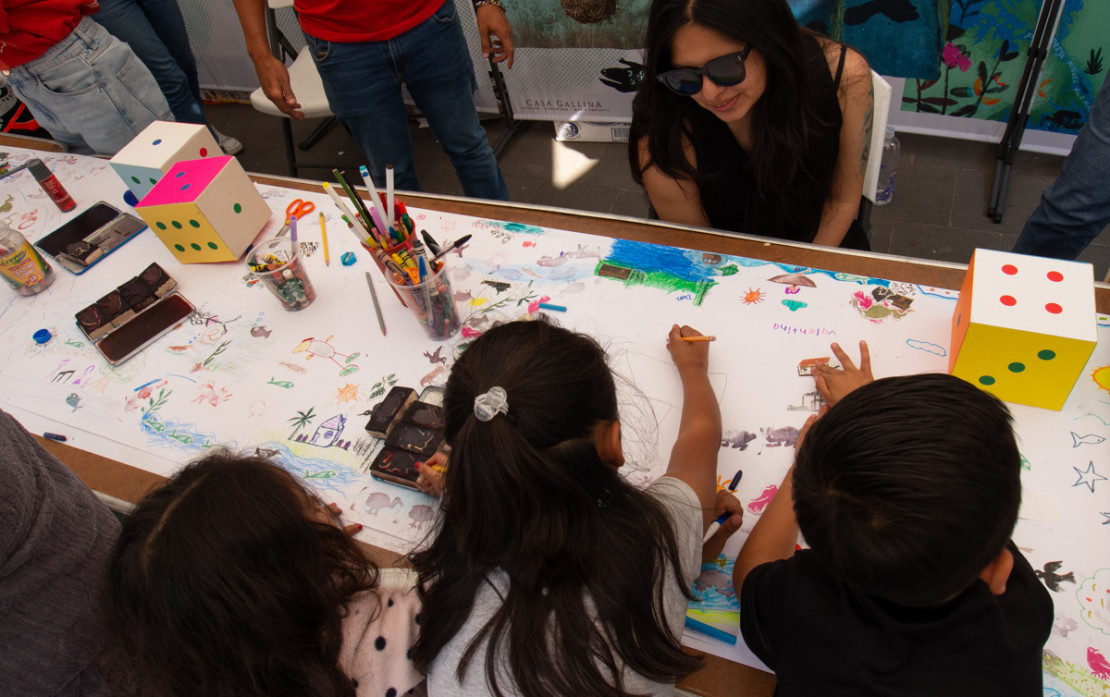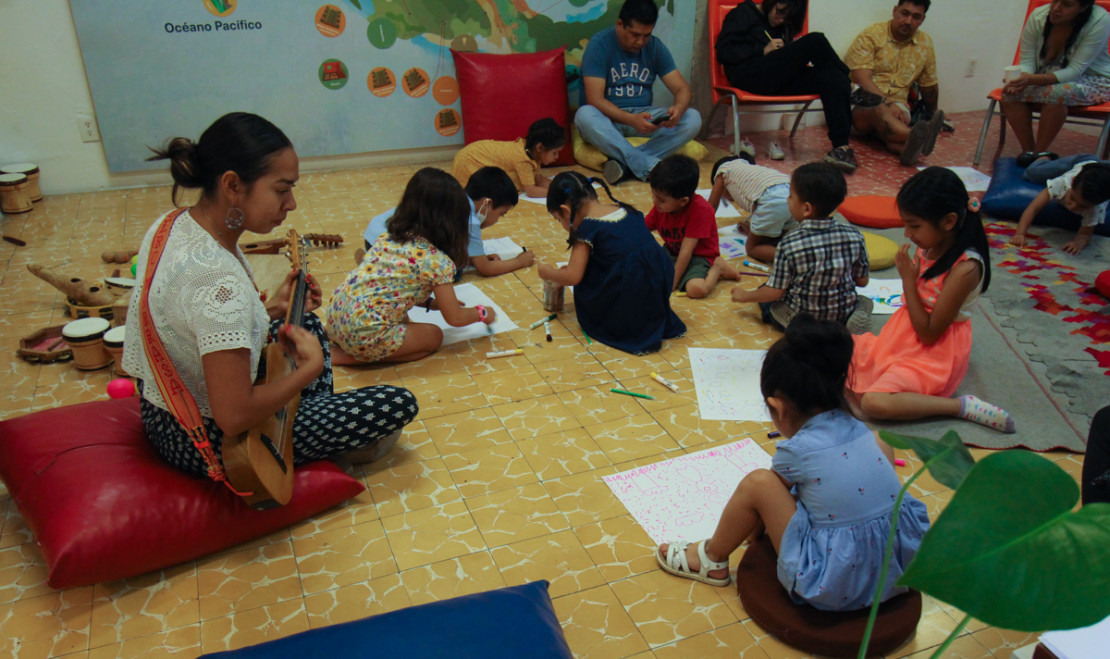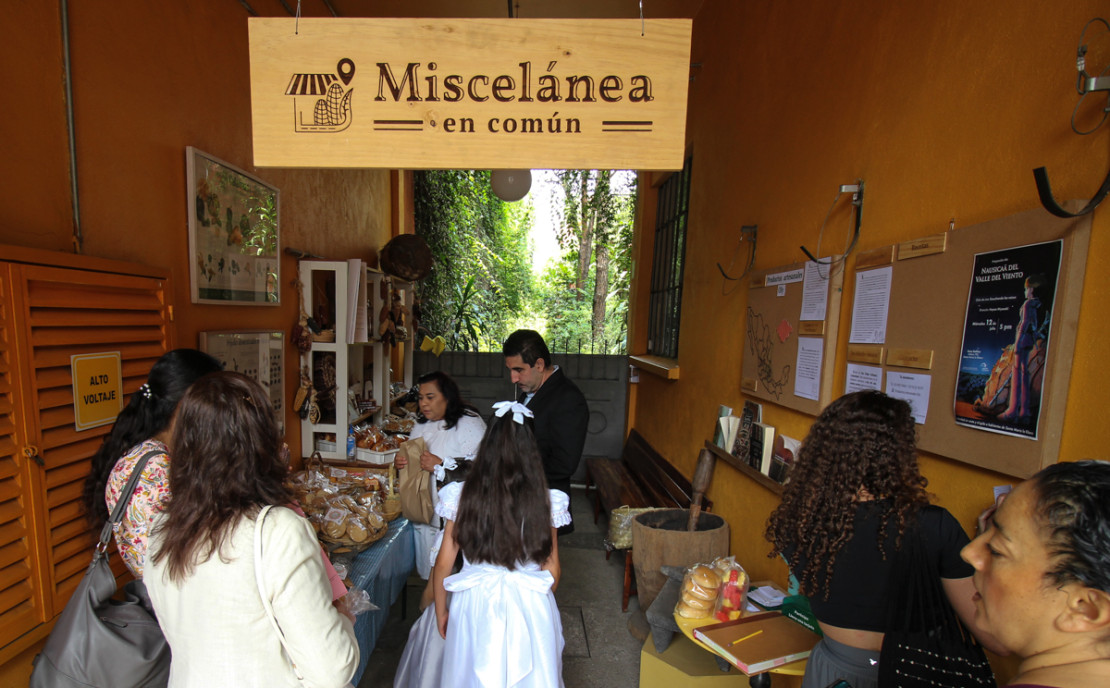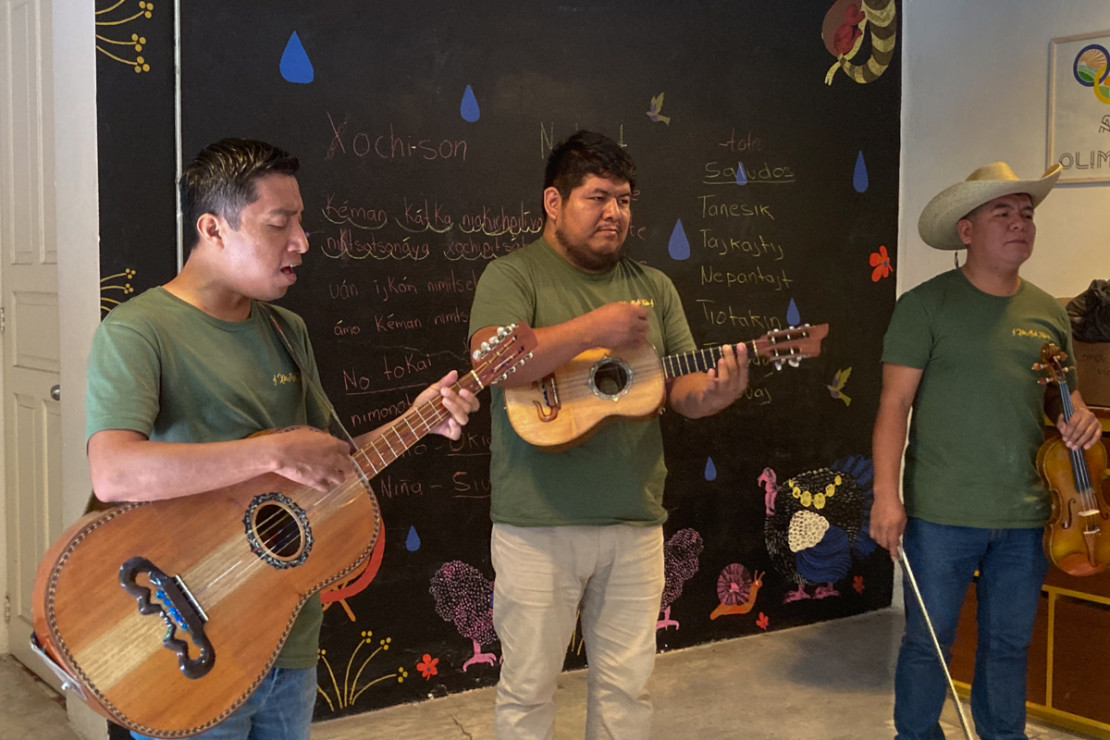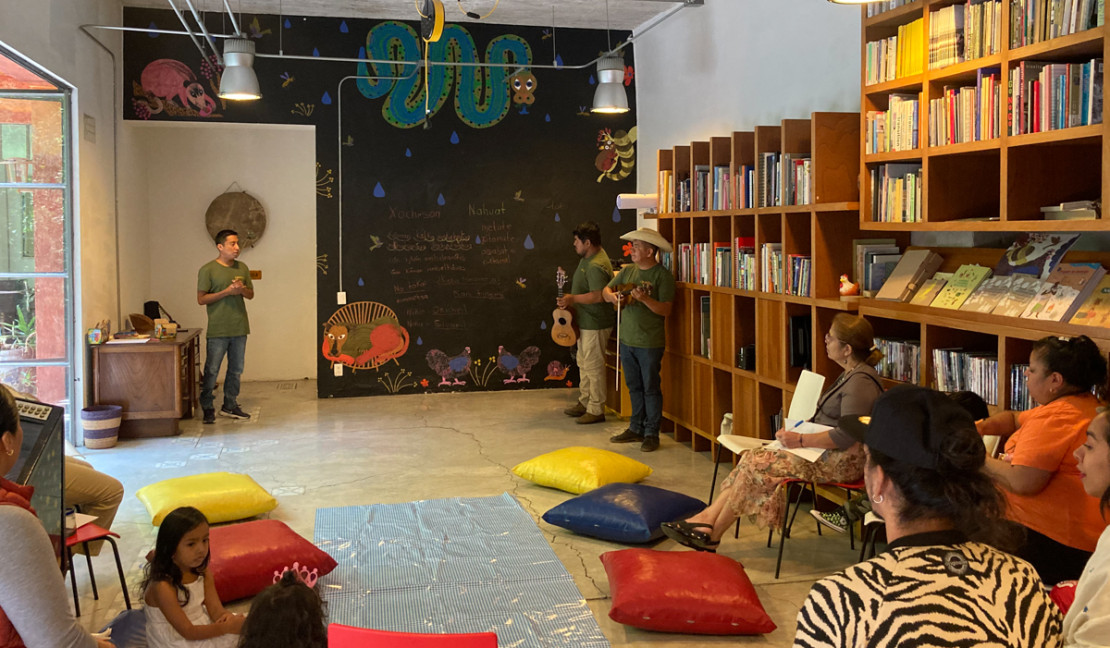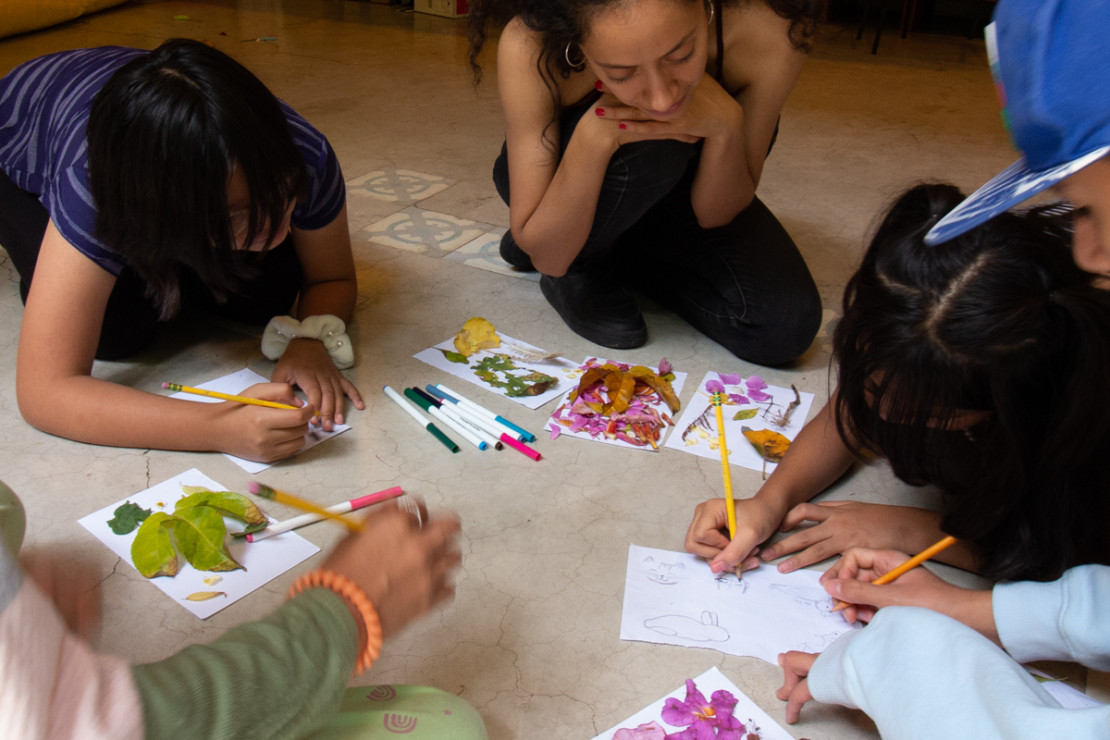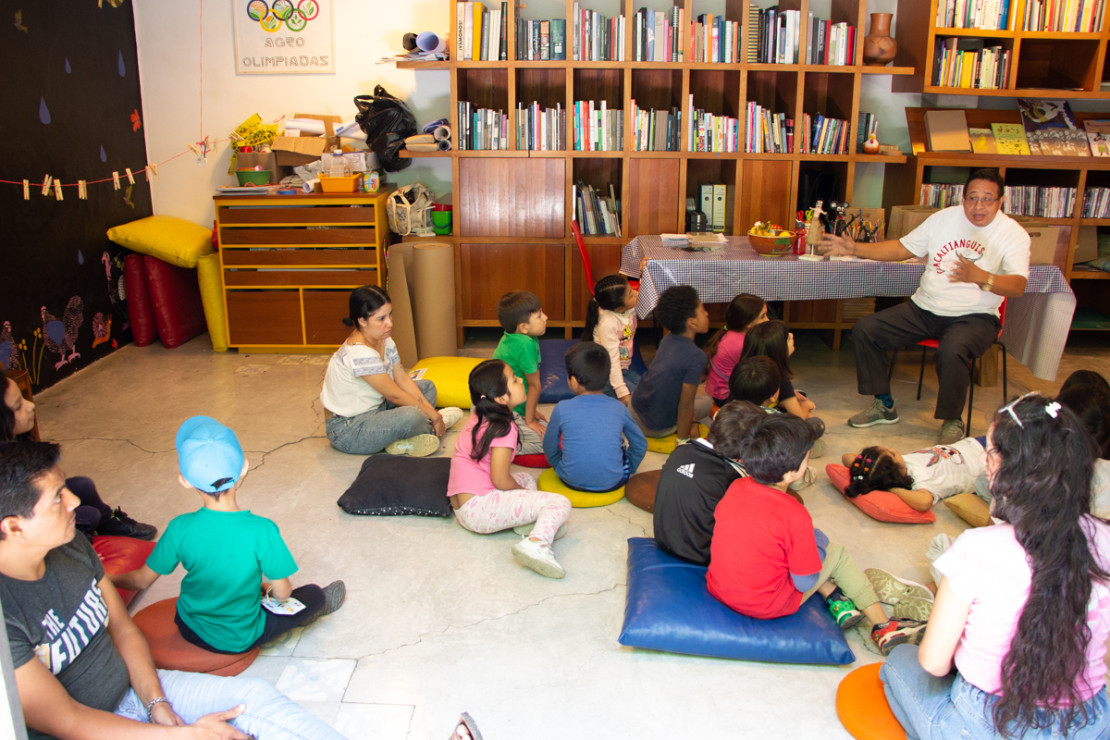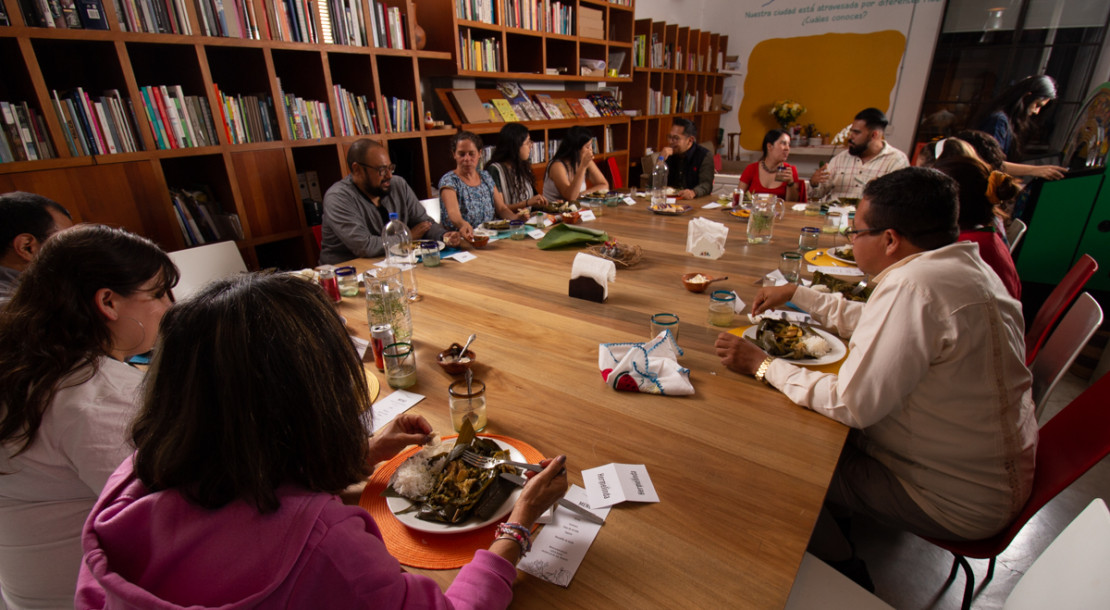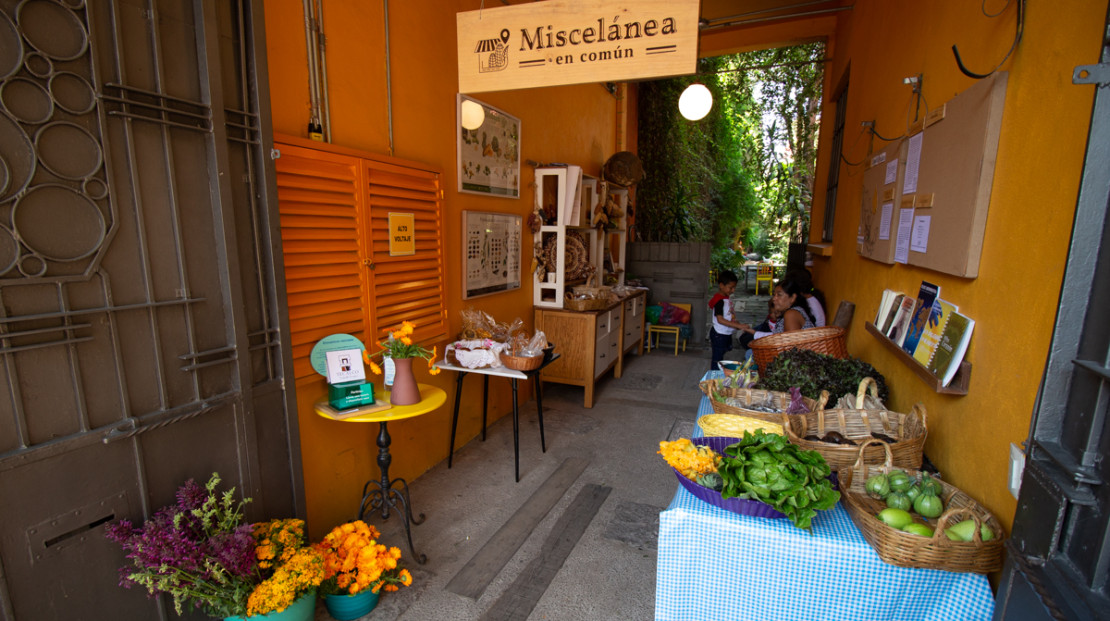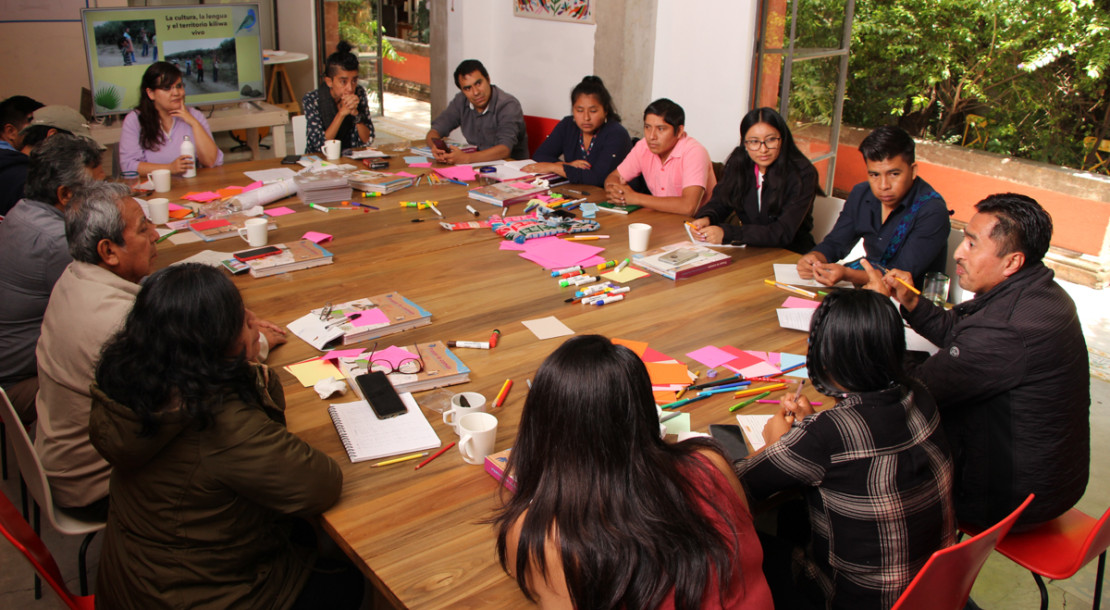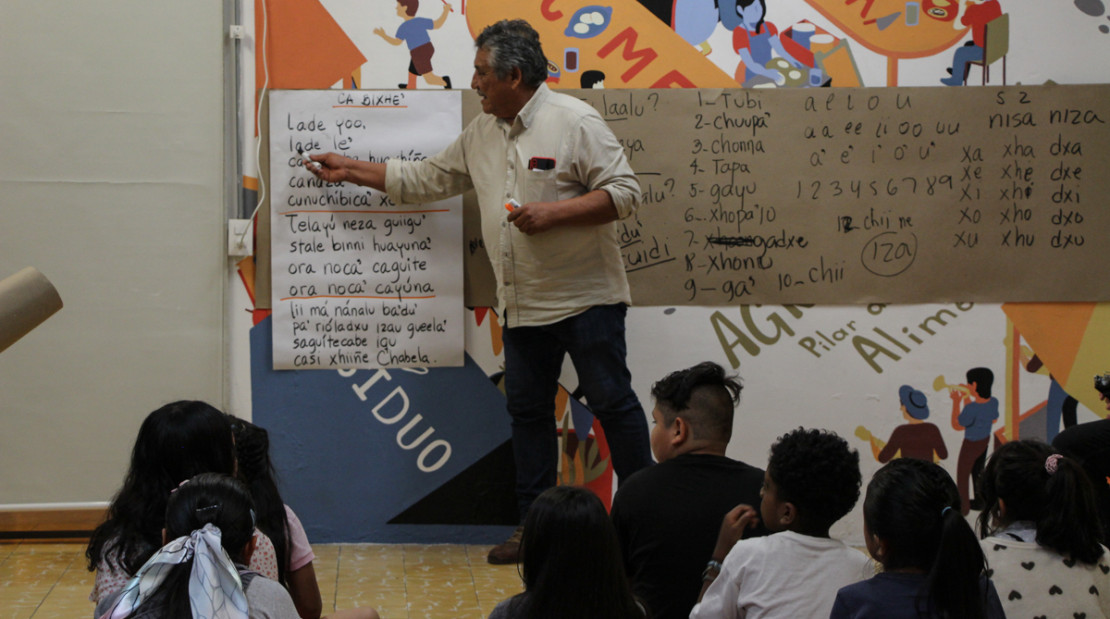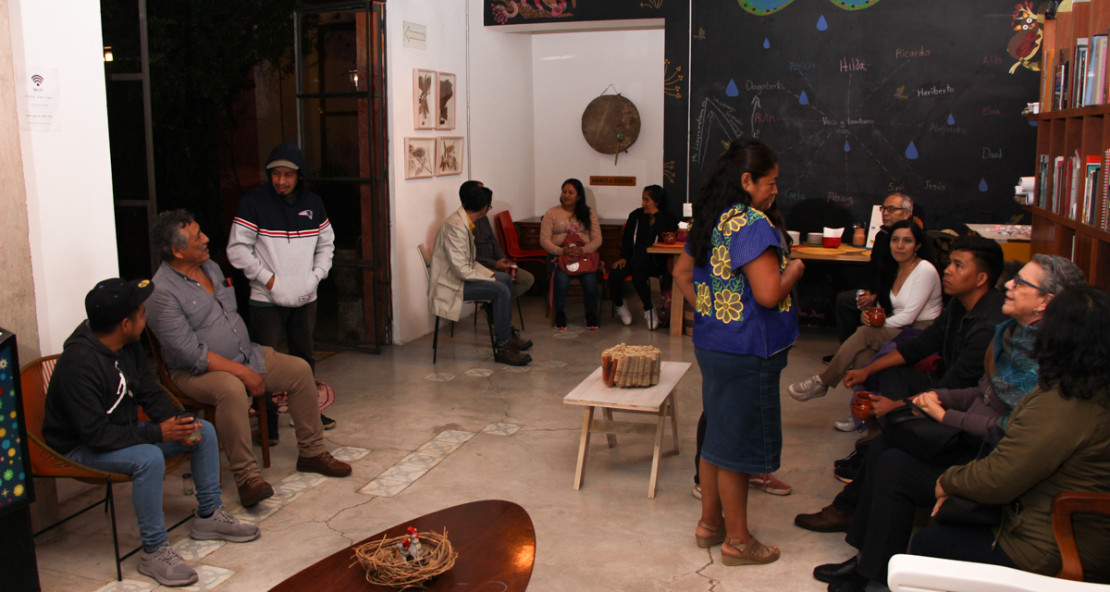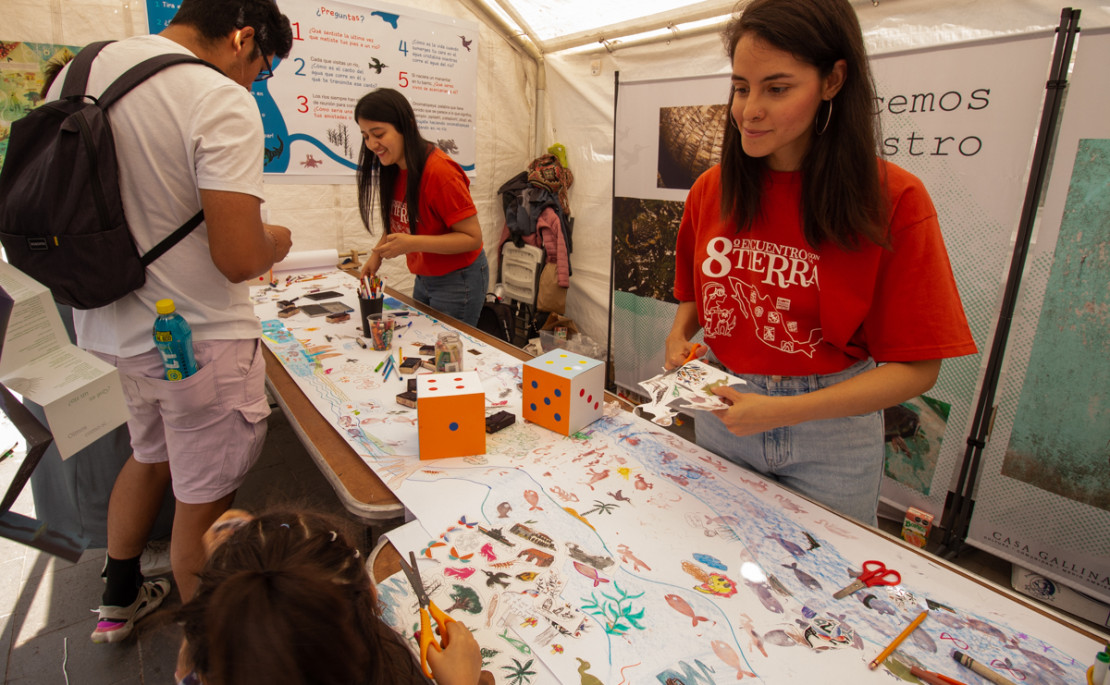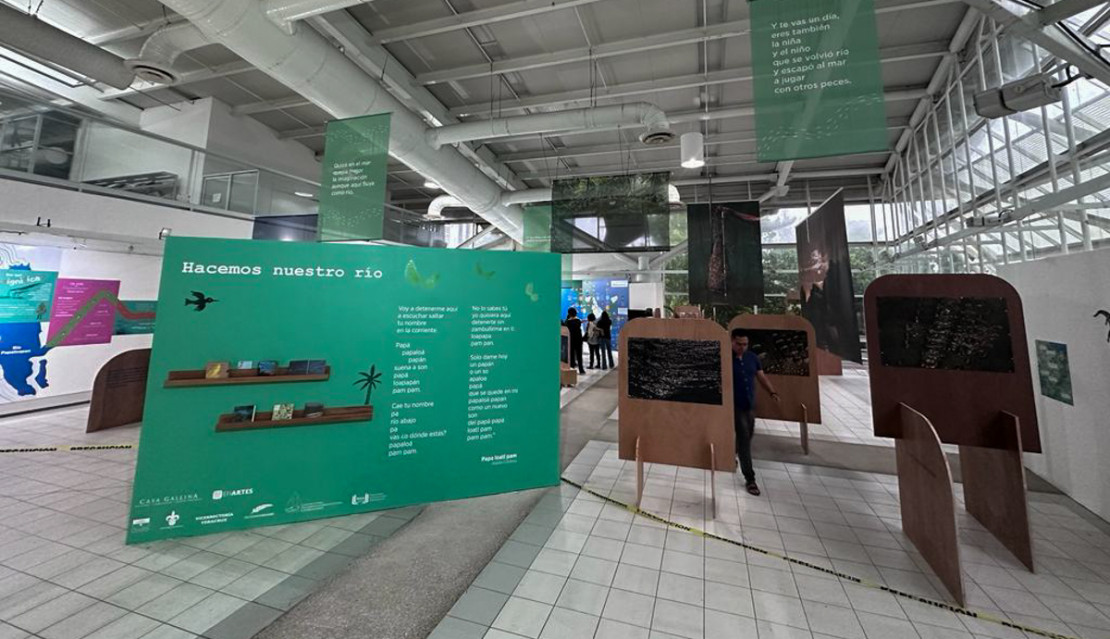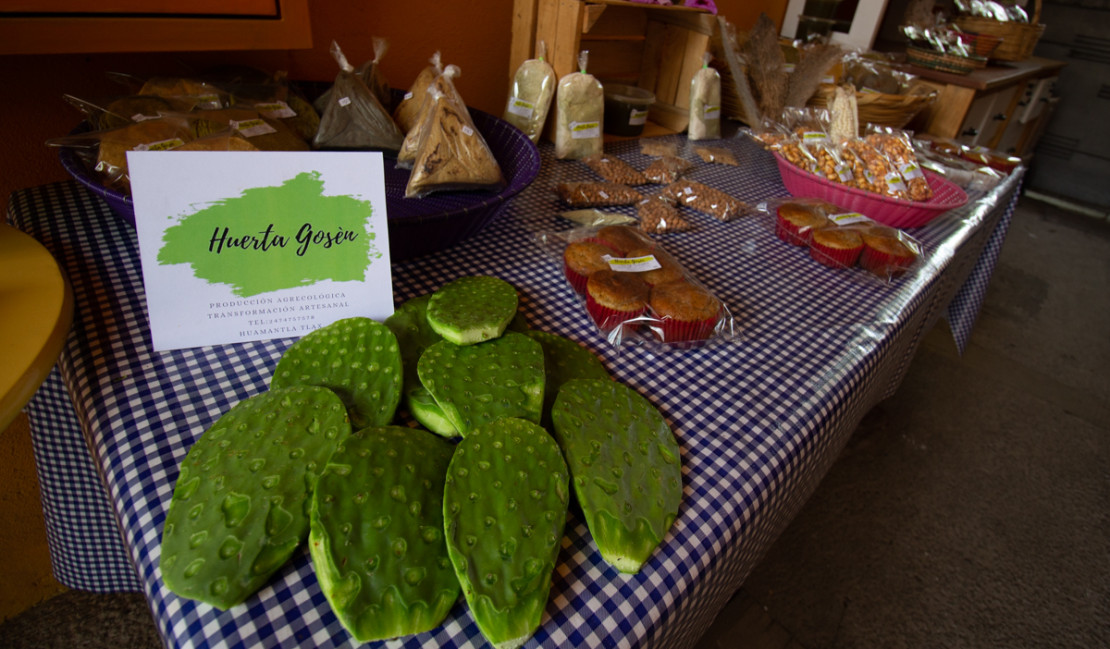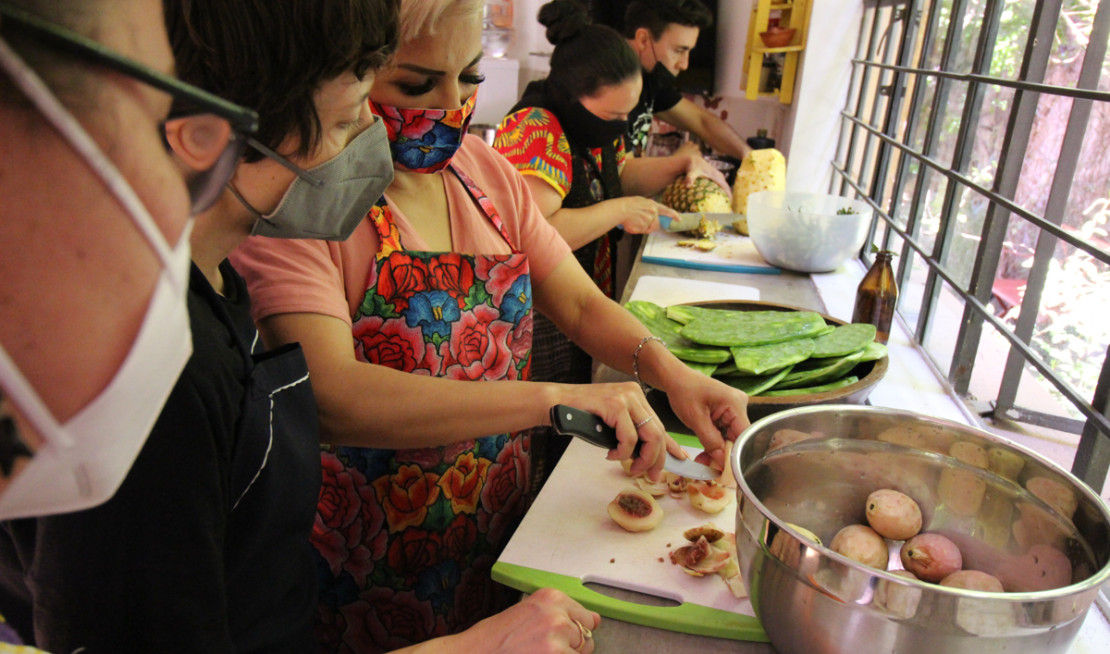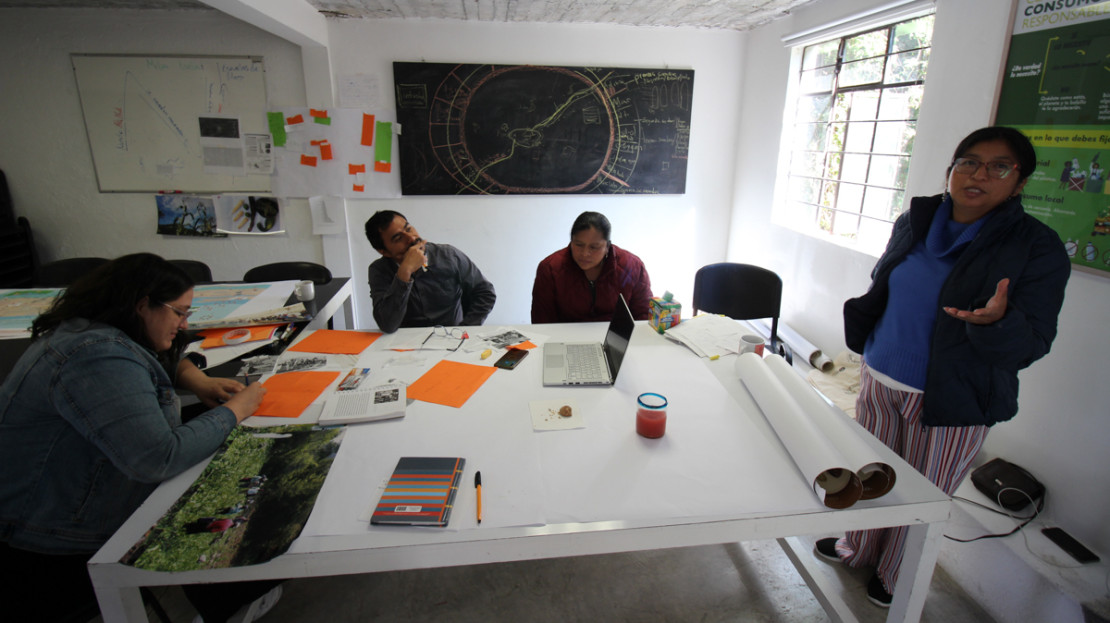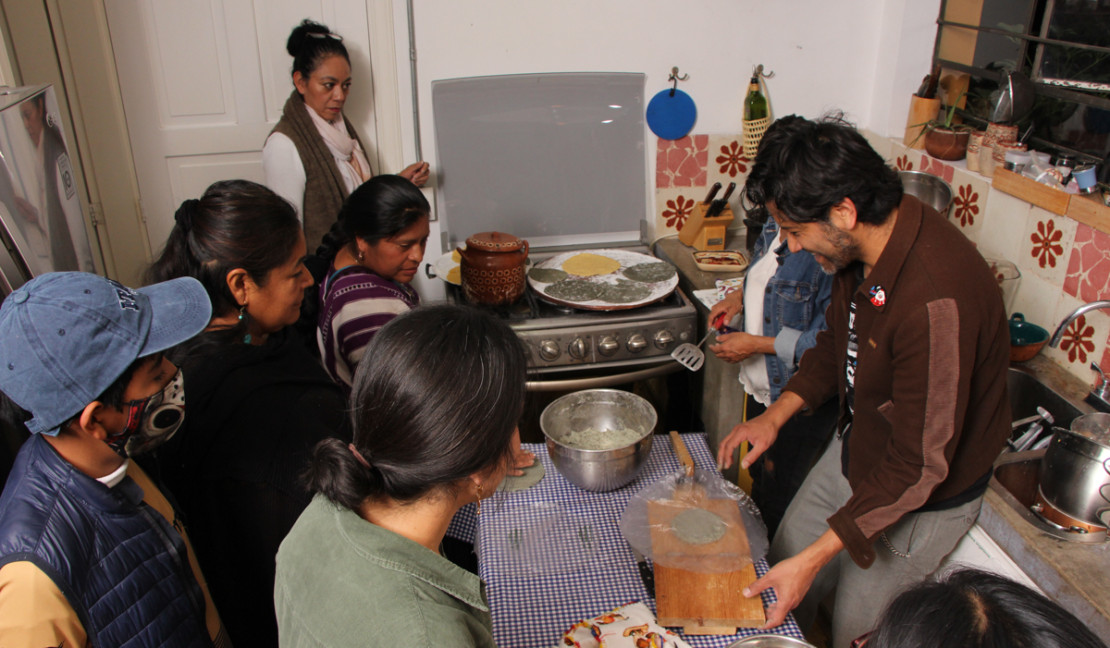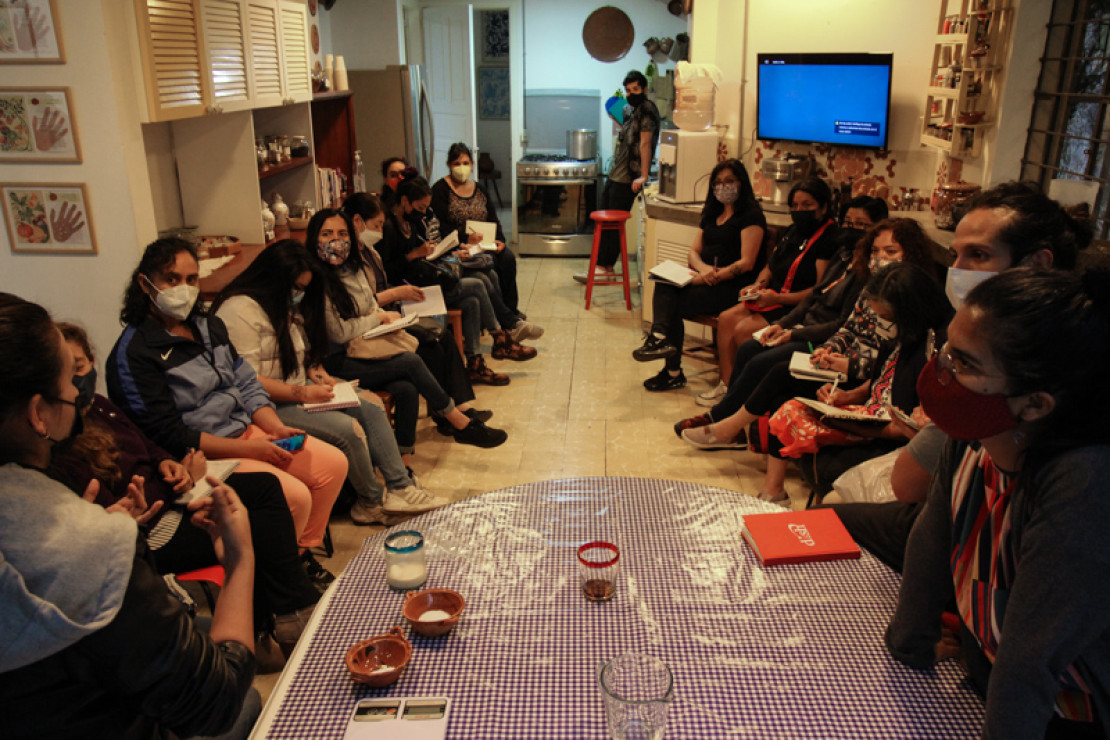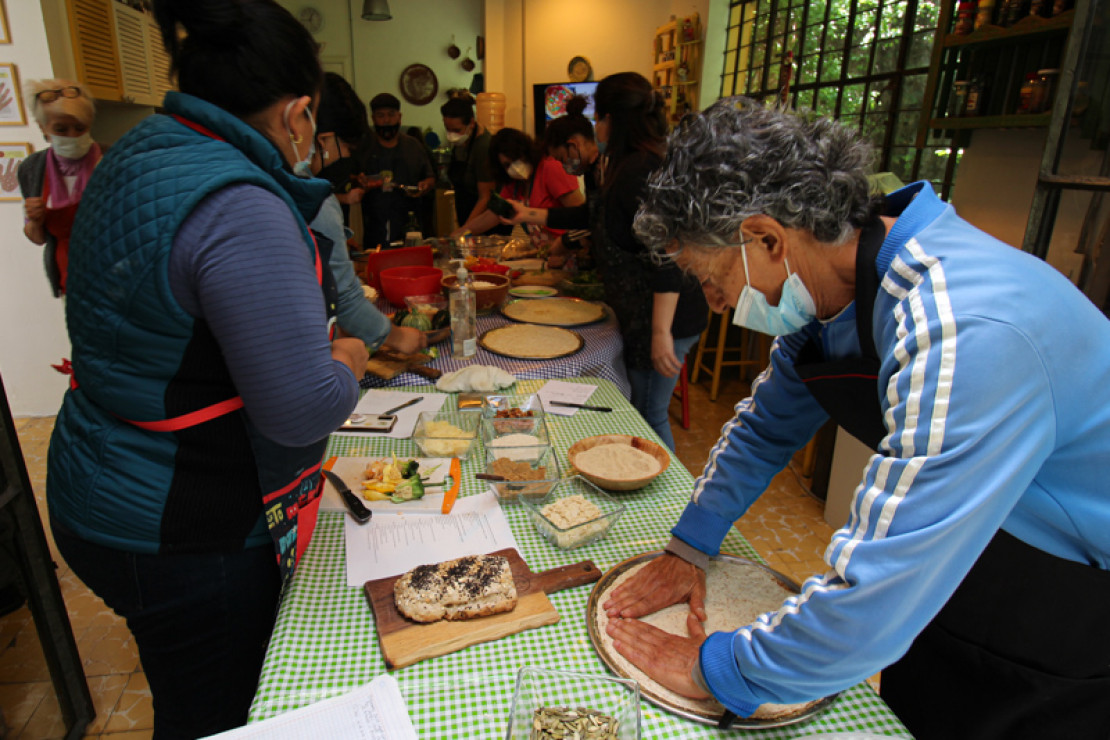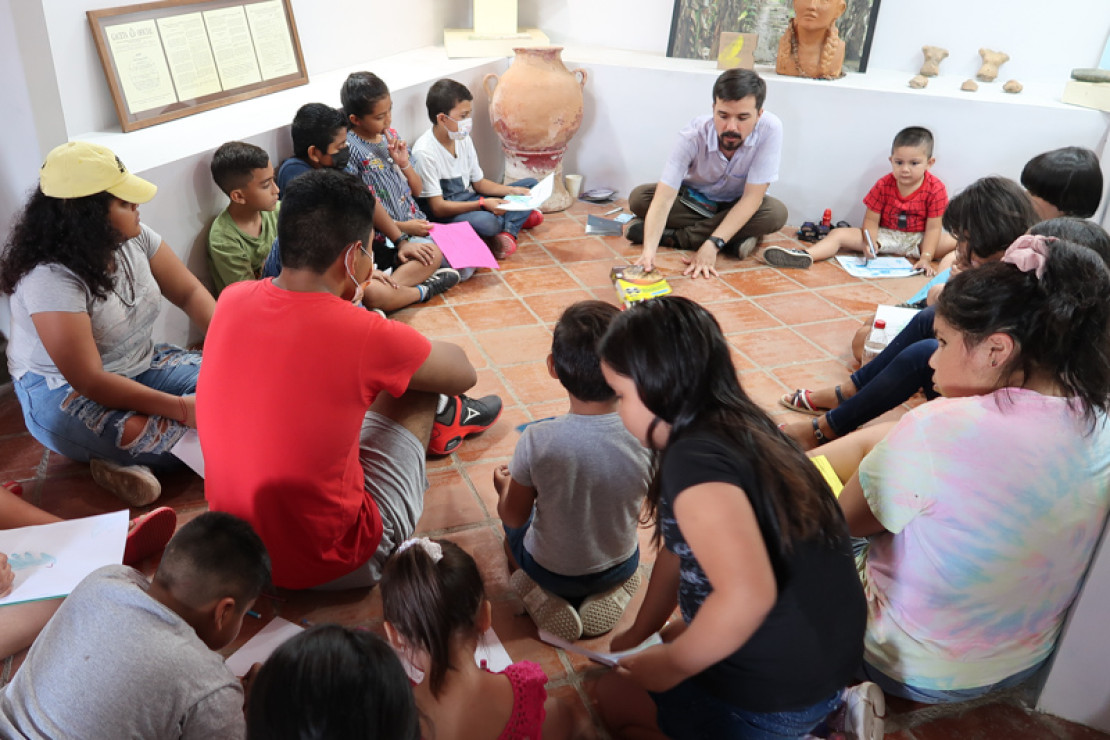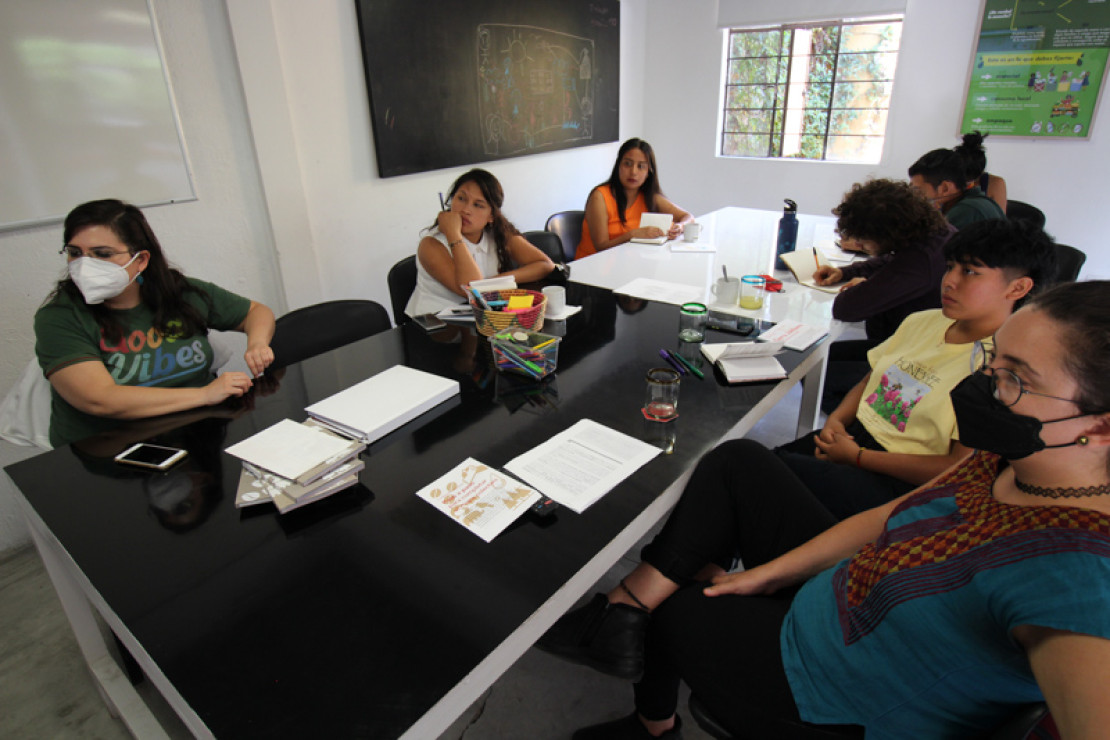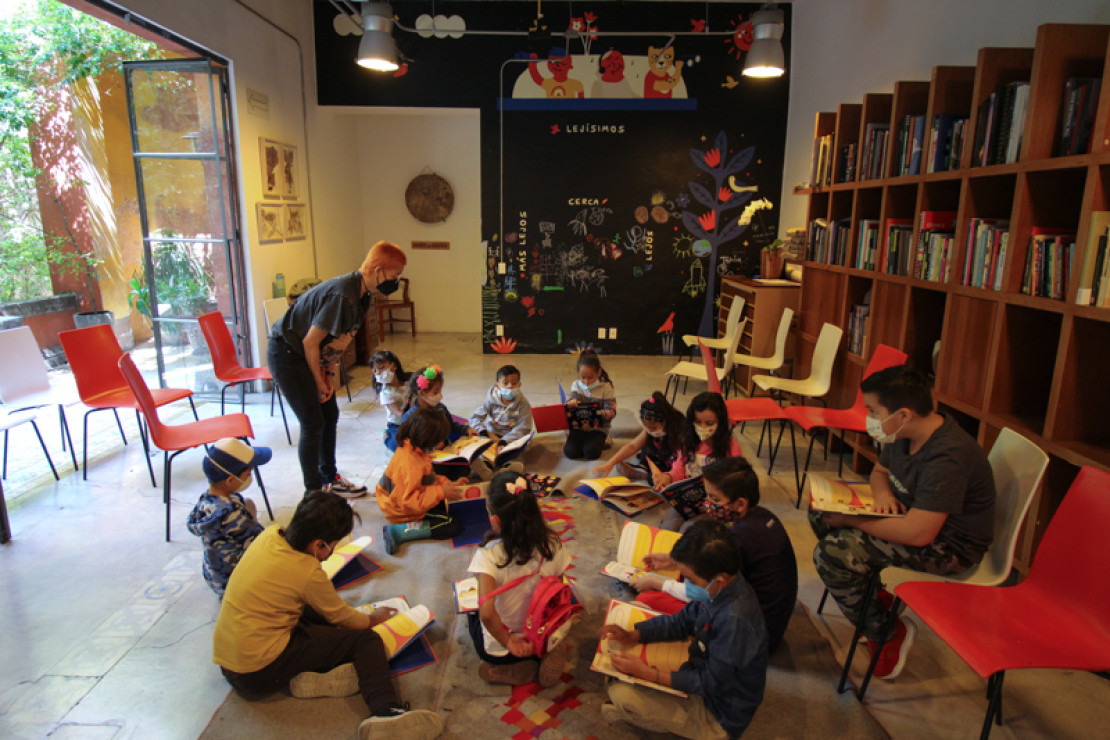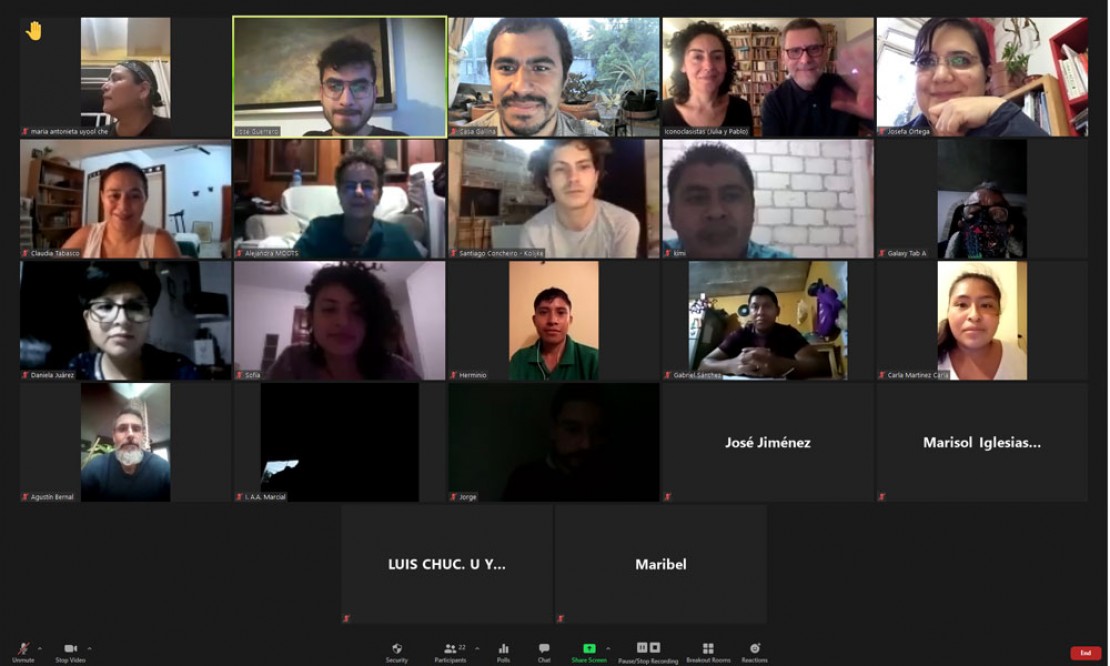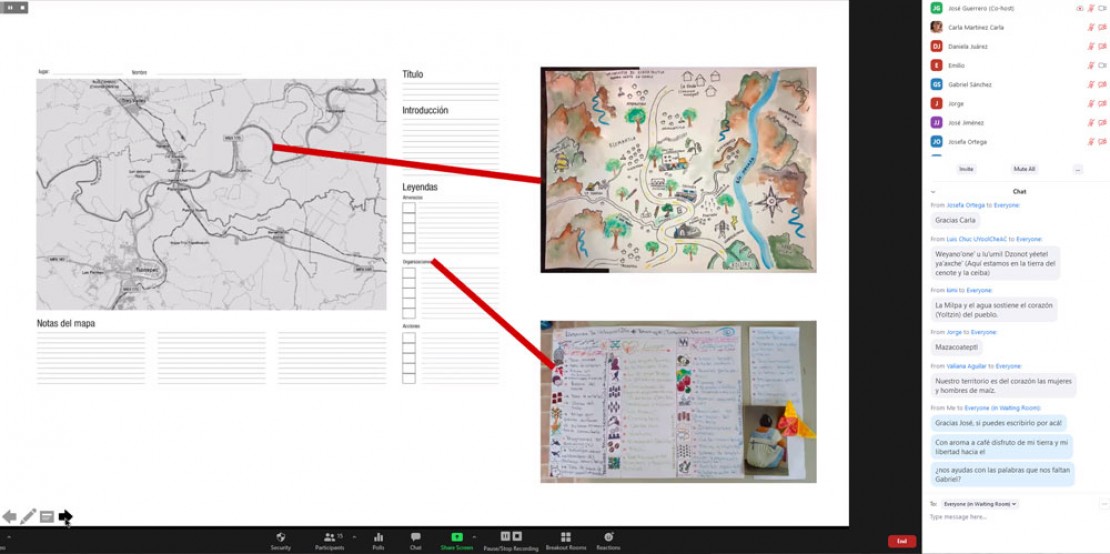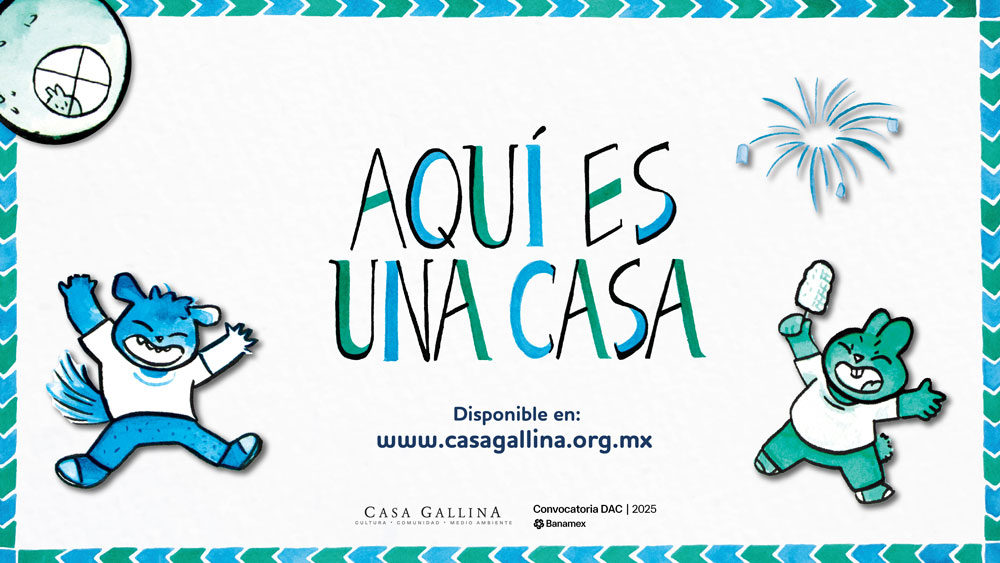Re-viewing territories
The programs that comprise this strategy aim at fostering a link between various communities and the territories they call home, with approaches of exchange and recognition of local knowledge. Varied dialogue is furthered through different tools -such as collective mapping, tours, children’s and cooking workshops- , in which each territory is reassessed based on the species that inhabit it, existing social interactions and the multiple relations between the ecosystems and the culture that characterize them. The strategy is built in alliance with organizations and community agents from various parts of the country.
We Make Our River - Community Activations
Dates: January to April 2025
Coordinator: Catalina Perez
Locations: Viejo Soyaltepec, Temascal, state of Oaxaca; Alvarado, Chacaltianguis, Cosamaloapan, Tlacojalpan and Tlacotalpan, state of Veracruz; and San Cristobal de las Casas, state of Chiapas.
Allies: Mano Amiga productiva; Mundo Sabana; Casa de las Mariposas Cultural Complex; Encuentro de Arte, Rebeldia y Resistencia hacia el dia despues; Benito Juarez bilingual school in Soyaltepec; Prof. Avelino Bolaños Palacios primary school in Chacaltianguis; Caracol Jacinto Canek and CIDECI.
Participants: 578 participants
A communal cultural project focusing on children that aims to foster imagination and representation of the relations of communities near the Papaloapan river from the point of view of the different meanings and images which are collectively built around bodies of water. Its axis and tool was the second edition of the publication We Make Our River, its portfolio of 50 postcards and the curatorial kit that derived from it. Over the course of four months, the curator Catalina Perez led groups, promotors, artists, professors and local cultural actors in various activities such as: deep listening; corporal dynamics; photography and drawing workshops; communal exhibitions; radio programs; presentations; mediations and conversations that were held in co-participation with schools, regional houses of culture and independent cultural spaces.
Open-air Archive Vol. 1, in the UNAM Geology Museum
Dates: February 4 to April 27, 2025
Artist: Enrique Mendez de Hoyos
Curator: Josefa Ortega, Eric Nava and Citlali Cordova
Researcher: Darcy Tetreault
Allies : Cultural Institute of Zacatecas, Geology Museum and the National System of Art Creators
Participants: 16,210 inhabitants, students, teachers and parents from Santa Maria la Ribera
The exhibition by the artist Enrique Mendez de Hoyos broached the impact of mining in Vetagrande, state of Zacatecas, through a combination of art and science. The exhibition included video testimonials by miners and inhabitants affected by this activity, as well as screen prints that reinterpret the territory as a map of social and affective networks marked by extraction. Complemented by the research of Dr. Darcy Tetreault, the exhibition opened a space for critical reflection on the social and environmental effects of extractivism, proposing an urgent dialogue from the local towards the global.
Rainy and Dry -The Ancestral Vision Of Time, in the Altepepialcalli, Milpa Alta,
Regional Museum
Dates: February 28 to May 5, 2025
Artist: Melissa Paredes
Researcher: Hector Celedon
Curator: Josefa Ortega and Angelica Palma
Allies: Calpulli Tecalco, Altepepialcalli Regional Museum and Coppel Foundation
Participants: 2010 inhabitants, students, teachers and parents from Milpa Alta
The Altepepialcalli Regional Museum in Milpa Alta hosted the exhibition Rainy and Dry -The Ancestral Vision Of Time, a proposal by Casa Gallina in collaboration with Calpulli Tecalco which gathers art, science and communal knowledge. The artist Melissa Paredes presented abundant collective work sourced from workshops with children and adolescents on the Fernando Benitez book-club, in Cualli Ohtli, in San Pedro Atocpan. Through these creations and the contributions by biologist Hector Celedon Muniz, the exhibition offered a sensitive look at the relation between territory, biodiversity and the Nahua cosmovision, reminding us of Milpa Alta’s vital importance for Mexico City.
Notes for Mapping a Territorial Body - U’yool’ché
Dates: February 18 and 19, 2025
Facilitated by: David Hernandez
Allies: U’yool’ché A.C.
Participants: 4 rural promotors
U'yool'ché is an ally that decided to mobilize to create a new narrative on Maya women in several communities in the state of Quintana Roo. Having shared their work plan with Casa Gallina, we created a brief support program that provided certain fundamentals to articulate the participative mapping tools that would be useful when developing their work in the field. These dynamics are part of a constant effort to exchange strategies with allied organizations in a logic of mutual support and learning.
Walking Time and Nature Encounter
Dates: March 14 to 16, 2025
Facilitators: Abrahan Coli, Julian Dzul, Matias Hoil, U Yits Ka'an, Ivan Jimenez, Roseli Jimenez, Perseida Tenorio, Donatila Giron, Rafael Renteria, Luzbey Mendez, Ruth Alonso, Rocio Julian, Noemi Huchin
Allies: Spore Initiative, Cocina Colaboratorio
Location: Santo Domingo Tomaltepec
Participants: 34 promoters, peasant advocates and speakers of native languages
“Walking Time and Nature” was a space for encounters, affinity and collective construction. Three years on from the group’s formation, the participants reaffirmed their commitment to recognize the symptoms of time in nature and walk together towards new forms of expression.
On this occasion, the group was hosted by Casa Pitahaya, in Santo Domingo Tomaltepec, where they shared knowledge, tools and experiences. Through dialogue and listening, they traced new work routes that will help them strengthen their management processes, create common strategies and stay connected at a distance. This encounter not only reinforced existing links, it also presented new chances to keep weaving living networks between territories, knowledge and affections.
Food From the Maize Field 2 - Dry Season
Date: November 9, 2024
Allies: Calpulli Tecalco
Workshop Leaders: Rosabal Rodríguez and Jacquelin Lara
Participants: 21 adults from Santa María la Ribera
In this second edition of the program of workshops on Food From the Maize Field, neighbors researched seasonal recipes for dry and cold periods, cooking atole with Mexican hawthorn fruit, corn bread and beans with corn dough. In addition to preparing this menu, conversation was directed at exploiting what the maize field provides during the time that corn cannot be harvested.
Rainy and Dry. The Ancestral Vision of Time at the UNAM Museum of Geology
Dates: July 22 to October 20, 2024
Artist: Melissa Paredes
Researcher: Héctor Celedón
Curator: Josefa Ortega
Allies: Calpulli Tecalco, UNAM Geology Museum and Coppel Foundation
Participants: 1,091 inhabitants, students, teachers and parents from Santa María la Ribera.
The exhibition Rainy and Dry. The Ancestral Vision of Time in Milpa Alta was opened on July 23 in its first venue, the Geology Museum, where it remained until October 20. The exhibition was a joint project carried out by Casa Gallina and Calpulli Tecalco, the artist Melissa Paredes and the biologist Héctor Celedón Muñiz. It explored the ecosystems and biodiversity of Milpa Alta, highlighting ancestral wisdom concerning natural cycles. A mediation program took place during the exhibition, with guided visits for neighbors, teachers and preschool, primary and secondary students from Santa María la Ribera. This exhibition took place thanks to support from the Coppel Foundation in the framework of Caleidoscopio 2023, a call aimed at supporting artistic and cultural projects in public spaces in Mexico.
Communal Shop: La Bolchevitta Farm
Dates: 23, 24, 30 and 31 August, 2024
Producers: Cipactli Suárez
Ally: Granja la Bolchevitta
Participants: 107 inhabitants of Santa Maria la Ribera
In August we welcomed La Bolchevitta, farm, a family project headed by Cipactli Suárez in the village of Santa Rosa Xochiac, in the municipality of Cuajimalpa. They brought various types of artisanal goatmilk cheese, turkey eggs, fruit and jams from their farm.
Summer Course City Kids – Exploring Milpa Alta
Dates: 29 July to 16 August, 2024
Facilitated by: Martha Garay
Monitors: Moisés Ledesma and Sofía Ortega
Artist: Melissa Paredes
Workshop leaders: Akire Huautli, Ale Retana, Pepe Retana, Daniela Rodríguez, Malintzin Lara
Ally: Geology Museum and Calpulli Tecalco
Participants: 45 girls and boys who live in Santa Maria la Ribera
The summer course City Kids – Exploring Milpa Alta was held, wherein girls and boys participated in artistic, cultural, planting and nutritional activities, all linked to the territory of Milpa Alta. Under the guidance of mediator Martha Garay, the participants explored this region through entertaining dynamics. During the course, they were accompanied by an artisan, an illustrator and a writer from Milpa Alta, who shared their knowledge on traditions such as the Chinelos dance, how to use a loom and create pigments, among others. Furthermore, the participants visited the exhibition Rainy and Dry. The Ancestral Vision of Time in Milpa Alta where they artist Melissa Paredes led an artistic activity with the children.
Summer Course for Adolescents: Ecopunk Summer
Dates: 22 to 26 July, 2024
Facilitated by: Proyecto Escrituras Experimentales (Cristina Torres and Christian Fajardo)
Participants: 13 adolescent inhabitants of Santa Maria la Ribera
The summer course Ecopunk Summer was aimed at adolescents aged between 13 and 17. Through a variety of walks in the neighborhood, the participants were asked to find ways to rediscover their surroundings, imagining new ways of inhabiting the city, that are integrated to the ecosystem. Over the course of that week, they held urban exploration exercises and learned how to employ editing tools for social media and to use of AI to design urban architecture for a possible, more sustainable, future.
Communal Shop: Azul Verde
Dates: 19, 20, 26 and 27 July, 2024
Producers: Clara and Alexa Valladares
Ally: Azul Verde
Participants: 53 inhabitants of Santa Maria la Ribera
In July we welcomed Azul Verde, a family project that comprises Clara, Alexa and Larissa, whose objective is to offer alternative, artisanal and organic cosmetic products to care for and clean the body and home. Located in Xochimilco, they work in collaboration with traditional chinampa farmers, ensuring the quality and origin of the inputs they use, helping activate the local economy.
Musical Flavors – the Baxin Family from los Tuxtlas, Veracruz
Date: 18 July, 2024
Guests: the Baxin Cagal family
Participants: 21 inhabitants of Santa Maria la Ribera
We welcomed the Baxin Cagal family from Los Tuxtlas, state of Veracruz, to the Musical Flavors encounter among neighbors. This family is dedicated to the preservation and dissemination of the son jarocho folk music genre, sharing its traditions through music and gastronomy. Neighbors from Santa Maria la Ribera enjoyed the traditional dishes prepared by Juana Cagal while we talked about the countryside, the cuisine of Veracruz and the region’s cultural roots. Furthermore, Master Arcadio Baxin shared his wisdom surrounding agricultural cycles and music, interpreting jarocho son that reflect the link between the land and the musical tradition in los Tuxtlas, Veracruz.
Communal Shop: Agroecológical Ranch El Arco
Dates: 21, 22, 28 and 29 June, 2024
Producer: María Teresa Brambila
Ally: Rancho Agroecológico El Arco
Participants: 52 inhabitants of Santa Maria la Ribera
In June we welcomed the Agroecological Ranch El Arco, who brought their array of animal products from Tlalpan: dairy, rabbit meat, beef and derivatives. They also brought produce from their orchard: fruit and jams, herbs and seasonings. All of these are reared, cultivated and produced with an agroecological focus.
Mondosyi Exhibition in La Enseñanza, San Cristóbal de las Casas, state of Chiapas
Dates: from 14 June to 9 September, 2024
Artist: Saúl Kak
Researcher: María Silvia Sánchez
Allies: La Enseñanza, San Cristóbal de las Casas, state of Chiapas
Participants: 271 attendants
This exhibition had a second venue in the city of San Cristobal de las Casas, in Chiapas, in La Enseñanza. It presented the video of Saúl Kak’s work, the infographics with the research by biologist María Silvia Sánchez and graphic representations of the local flora and fauna, along with Zoque words for said biodiversity. These elements presented an integral view of said biodiversity and the links between inhabitants and their surroundings. The exhibition not only highlighted the region’s natural riches, but it also broached how an oral narrative and the creation of stories contributes to understanding the region’s ways of life.
Communal Shop: Oyameyo Cooperative
Dates: 17, 18, 24 and 25 May, 2024
Producers: Oliva Navarro and Olmo E. Manrique
Ally:Oyameyo Cooperative
Participants: 50 inhabitants of Santa Maria la Ribera
We received the Oyameyo Cooperative, a project that produces everyday products based on the principles of herbalism, promoting their benefits for health. They prepare tinctures, pomades, syrups, herbal cushions, and oils for aromatherapy.
Worksop: Rainy and Dry
Date: 4 May, 2024
Allies: Calpulli Tecalco
Facilitated by: Melissa Paredes
Participants: 13 children and youths from Milpa Alta
In collaboration with Calpulli Tecalco, through a visit to the community of San Pedro Actopan in Milpa Alta, we launched an invitation for boys, girls and youth who live there to go on walks in planting areas. The artist Melissa Paredes directed a mapping and observation of surroundings session, and shared certain tools she uses as a landscapist. The participants produced a series of watercolor landscapes and reflected on the changes the place they dwell is undergoing and the visible effects there are.
Mondosyi Exhibition in the Geology Museum
Dates: from 15 February to 21 April, 2024
Artist: Saúl Kak
Resercher: María Silvia Sánchez
Allies:Instituto de Geología at the UNAM
Participants: 921 inhabitants of Santa Maria la Ribera
This exhibition focused on disseminating aspects of the Zoque culture, from a region in the state of Chiapas, its biodiversity and the relations between its inhabitants. From an oral narrative to the construction of fiction to understand the surroundings, the exhibition showed how links between different ways of life are woven. Using three elements —a video, an infographic and graphic representations of flora and fauna – the exhibition offers a panorama of the Zoque region, complemented by visits with activities and conversations that delve into these aspects.
Exhibition Mondosyi
Dates: 13 febrero al 21 de abril de 2024
Venue: Museo de Geología
Video: Saúl Kak
Biological Research: María Silvia Sánchez Cortés
Educational Program: Cecilia Pompa and Moisés Ledesma
Allies: Geology Museum of the UNAM
Participants in educational activities: 927 inhabitants, students, teachers and parents from Santa Maria la Ribera.
Visitors to Exhibition: 17,168
This exhibition makes an audiovisual overview of the cultural and environmental diversity in Rayon, state of Chiapas. Focused on the Zoque cosmovisión, it tell the legend of the Mondosyi, an elf who dwells in the mesophile jungle of the misty mountains and who brings together the human, natural and supernatural world. Aiming to sensitize and bring the Santa Maria la Ribera community closer to other cultures and visions of the world, guided tours were held schools and neighbors, highlighting the importance of nature and its link to the legends that live in our collective imagination.
Encounter Walking Time in Maní, Yucatán
Date: March 14-18, 2024
Coordinated by: U yits Ka’an, Spore; Grupo Caminar el tiempo; and Casa Gallina.
Facilitated by: Rafael Rentería and José Guerrero
Allies: Dagoberto Robles de la Red de Juventudes Wixárikas, Irene Sánchez de la Red REGMABI, Patricia Sántiz de Ixim and Joy Joy.
Participants: Members of Spore, Casa Gallina, Alianza Milpa, Radio Tzinaca, REGMABI, La Red de Juventudes Wixárikas, Joy Joy, Ixim, Escuela Itinerante de Agua y Artes, Territorios de escucha, Escuela Itinerante de agricultura sagrada, agua y artes; Una mano para Oaxaca, La Red Chacha Warmi, Instituto Superior Intercultural Ayuuk, la Universidad Intercultural de Campeche, and U Yits Ka’an.
The agroecological school U Yits Ka’an welcomed teams from Casa Gallina and numerous agents and organizations from Nayarit, Chiapas, Oaxaca, Yucatan, Quintana Roo and Argentina to reflect on Xook K’iin, a Maya concept used to name knowledge related to predicting time, the relation between man and his surroundings and climatological interpretation through the signs nature provides for us.
On Casa Gallina’s part, the mediators, Rafael Rentería and José Guerrero implemented a laboratory to share the collective mapping methodology through didactic exercises such as developing a story and prototypes of story-maps, fostering reflection and collaboration between the participants.
To conclude the event there was a plenary session where participants shared what they could offer, their needs and desires for the future, thinking of shared routes to develop collaboration in projects that focus on generating tools that foster the consolidation of learning around the practices of reading and walking time.
We Make Our River in Ramón Alva de Canal Gallery in Xalapa, Veracruz
Date: December 14, 2023 - April 14, 2024
Coordinated by: Casa Gallina and Galería Ramón Alva de Canal, Veracruzana University
Curated by: Catalina Pérez and Josué Martínez
Allies: Galería Ramón Alva de Canal, in Xalapa, state of Veracruz, Veracruzana University
Participants: 4294 visitors
Format: in person
This is the third version of the exhibition previously shown in USBI at Boca del Rio, in the state of Veracruz and in the Geology Museum in Mexico City. This exhibition was displayed with a more adult curatorial focus to address a university public. During the 57 guided tours offered by the university’s team, the gallery received various groups of students as well as 1,153 girls and boys. It included parallel activities that foresaw the inclusion of the local artistic community in a dialogue about their territory. This version of the exhibition was a resounding success with many visitors/inhabitants of Xalapa, since many of them have links to the Papaloapan river basin.
Communal Shop: Ocomantla Community Productive Center, CCPO
Dates: October 13, 14, 20 and 21; November 10,11, 24 and 25, 2023
Producers: Ocomantla Community Productive Center
Participants: Inhabitants of Santa Maria la Ribera
We invited the promoters and producers from the Ocomantla Community Productive Center (CCPO) to the communal shop, where they brought a wide variety of produce harvested and grown agroecologically in Ocomantla, in the state of Puebla, such as ground coffee, seasonal fruits, jams, biofertilizers and products from native and European bees.
We Make our River in the Geology Museum of the UNAM
Dates: August 8 to October 22, 2023
Photographs: Dolores Medel, Enero y Abril and Lizette Flores
Poems: Adolfo Córdova
Illustrations: Cuauhtémoc Wetzka
Curated by: Catalina Peréz Meléndez and Luis Josué Martínez Rodríguez
Allies: Geology Museum of the UNAM
Participants: 849 inhabitants, students, teachers and parents from Santa Maria la Ribera.
The exhibition We Make our River addresses the affective and sensorial relations of riverside territories in the Papaloapan River basin, in the State of Veracruz. The exhibition gathers the intergenerational memory of people who dwell along the banks of the Papaloapan. The main goal is to offer poetic perspectives of the possible relationships with a river - initially this tool took the form of a publication conceived as a photobook, although it evolved into books with different formats and a map that were distributed free of charge, mainly among the basin’s inhabitants.
Communal Shop: Huerto Tlatelolco
Dates: October 6 and 7, 2023
Producers: Huerto Tlatelolco
Allies: Cultiva Ciudad
Participants: inhabitants of Santa Maria la Ribera
Casa Gallina welcomed Huerto Tlatelolco, a local project from the center of Mexico City that strives to create access to healthy and sustainable food, and promote reflection to build healthier, more participative and sustainable communities. They brought and sold inputs for urban agriculture such as substrates, biofertilizers, seeds and produce grown and harvested agroecologically.
8th Encounter With Earth - We Make Our River
Date: October 1, 2023
Facilitated by: Moisés Ledesma, Rodrigo Simancas, Paulina Alcéntara, Ana Anaya and Mariana Malinalli
Ally: Geology Institute and Geology Museum, UNAM
Participants: 183 visitors
As part of the 8th Encounter With Earth, organized by the Geology Museum located on Santa Maria la Ribera’s main square, we undertook educational activities inspired by the publication We Make Our River. With the help of visitors, we drew, wrote and built a collective river. We also offered two guided tours of the exhibition We Make Our River within the Geology Museum.
Communal Shop: Calpulli Tecalco
Dates: Saturday September 2, 23 and 30, 2023
Producers: Angélica Palma and Rosalba Rodríguez
Ally: Calpulli Tecalco
Participants: 176 inhabitants of Santa Maria la Ribera
During the month of September we welcomed Calpulli Tecalco to commemorate the month of maize. They brought with them plants, vegetables and food produced in San Pedro Atocpan, grown in the Malacachtepec Momoxco maize fields, located in Milpa Alta. Calpulli Tecalco is an organization that focuses on the study and revitalization of forms of production, as well as the customs and ancestral knowledge that are part of the cultural heritage of the Nahua communities in the valley of Mexico. Through their work with Casa Gallina, they have established a solid program of collaboration with inhabitants of Santa Maria la Ribera, in order to rethink consumption and the relationship between city and countryside, widening the perspective on the importance of land conservation and preserving the biodiversity present in Mexico City.
Summer Course - We Make Our River
Date: August 1 to 19, 2023
Facilitated by: Cecilia Pompa
Monitors: Moisés Ledesma, Julia Rocha and Paulina Alcántara
Ally: Geology Museum
Participants: 47 girls and boys living in Santa Maria la Ribera
The Summer Course We Make Our River was inspired by the publication of the same name, which gathers the voices of children and adults who live near the Papaloapan River. Through a program of fun activities designed and led by the teacher Cecilia Pompa, various axes were approached, such as a territory’s memory, water as a vital resource and transformation of the environment. During the course, the children had the chance to meet and interact with some of the book’s creators, such as Catalina Perez, the editor, Adolfo Cordova, author of the poems, and the photographer Enero y Abril. Furthermore, professor Jesus Argimir Rangel visited along with his family and shared the traditions of Cosamaloapan, in the state of Veracruz.
Summer course - I Take Care of Myself and Our Surroundings
Date: July 25 to August 10
Ally: Ciudad Cuauhtémoc Community Center
Participants: 80 girls and boys
This year, the annual Summer Course at Ciudad Cuauhtémoc Community Center focused on prevention and their educational program included Life In My Surroundings, the book published and shared by Casa Gallina.
Flavors Shortening Distances - Veracruz
Date: August 9, 2023
Hosts: Leticia Acosta and Argimir Rángel
Guests: Catalina Pérez and Cecilia Pompa
Participants: 11 inhabitants of Santa Maria la Ribera
During the month of August we welcomed professor Jesus Argimir Rángel and Leticia Acosta, who visited us from Cosamaloapan, in the state of Veracruz, to participate in the activation of the publication We Make Our River. For this encounter between neighbors, Leticia prepared a menu with typical dishes from the Veracruz basin: fried plantains, tortilla soup, tapixte (a sort of stew) appetizers and toritos (a traditional drink). During dinner, neighbors shared experiences on cultural traditions in the river basin region of Veracruz, along with the book We Make Our River in the company of its editor, Catalina Perez.
Didactic Concert: Nahuatl Through Son From the Huasteca Region
Date: August 5, 2023
Musicians and Mediators: Xinach Trío
Participants: 4 girls and boys and 5 adults from Santa Maria la Ribera
The musicians in Xinach Trio, a group that plays Son from the Huasteca Region, originally from San Miguel Tzinacapan Cuetzalan, state of Puebla, shared their language and musical traditions through a didactic concert. Through Son from the Huasteca they taught neighbors of different ages to greet each other, give thanks, name animals and express other things in their mother tongue: Nahuatl.
Song and Dances of the Fandango
Date: July 29 to August 5, 2023
Coordinated by: Casa Gallina
Facilitated by: Lucero Farías
Participants: 12 neighbors from Santa María la Ribera
In this workshop, girls and boys practiced interpreting typical songs of the traditional Fandango that are linked to childhood and nature, such as La guacamaya (The Macaw), La tuza (The Gopher) and Los enanos (The Dwarves), among others.
Voices and Living Territories - Encounter Between Dinamizers, Teachers and Promoters of Mother Tongues
Dates: July 24 to 28, 2023
Facilitated by: Elena Ibáñez and David Hernández
Mediators: Rafael Rentería, Jose Guerrero and Aldo Martínez
Allies: CCPO, Memoria Mazateca. Zapotec Workshop Ca bixhe' nadxi' ña' (The Naughty Dwarves), Ikoots Community High School, Joy joy, Ixim, Network of Indigenous Youth, Ricardo Flores Magon School in Huautla de Jiménez
Participants: Patricia Márquez, Hilda Castro, Heriberto Prado, Ruth Figueroa, Jesús Hernández, Herminio Gijón, Carla Martínez, Ricardo Cantero, Patricia Santíz, Dagoberto Robles, Saúl Kak, Alejandro Dorantes and Angélica Palma.
This encounter gathered speakers, community agents, teachers, defenders and promoters of language from different communities throughout the country, to integrate a diagnostic, participatory and action group in which to share conceptual tools and collective mapping methodologies, in order to reinforce the work of educational projects or others fostering the linguistic rights of communities. It also promoted social gatherings and workshops between this network and neighbors from the Santa Maria la Ribera community.
Those invited to the network cover different actions, including promotion, translation and education in languages such as enna (Mazatec), náhuatl (Nahuatl), wixárika (Huichol), ombeayiüts (Huave), bats'il k'op (Ttseltal), tutunakú (Totonac), diidxazá (Zapotec) and o´re pät (Zoque) and come from communities located in the isthmus and highlands of the state of Oaxaca, the jungle and highlands of the state of Chiapas, the northern highlands and settlements in the state of Puebla and Nayar in the state of Nayarit.
An outcome of this encounter is continuity for the prototypes of maps-stories that resulted from this work and which will be activated in the guests’ communities during the first semester of 2024.
Flavors Shortening Distances
Date: July 26, 2023
Facilitated by: Angelica Palma and Rosalba Rodríguez
Ally: Calpulli Tecalco
Participants: 24 inhabitants of Santa María la Ribera and promoters of original languages
During this dinner gathering, the cooks Angelica Palma and Rosalba Rodriguez prepared a menu of dishes made with ingredients from the maize field to share with a group of neighbors and promoters of original languages from different territories who were participating in the encounter Voices and Living Territories - Encounter of Dynamizers, Teachers and Promoters of Mother Tongues. This encounter fostered interpersonal relations and sought to integrate a network that transcends work links and builds collaboration through affective dialogues between participants. On this occasion, in addition to the food, the guests shared stories and songs in their mother tongue.
Words to Recognize the World - Zapotec Language and Songs
Date: July 25, 2023
Facilitated by: Jesús Hernández Los duendes traviesos (The Naughty Dwarves)
Ally: Zapotec Workshop Ca bixhe' nadxi' ña' (The Naughty Dwarves)
Participants: 12 girls and boys from Santa María la Ribera
Workshop for children that shared stories, legends, songs and words, led by professor Jesús Hernández, who developed a methodology to learn didxazá (Zapotec) in Ixtepec, state of Oaxaca. The workshop focused on understanding the link that exists between language and cosmovision, using music as a learning tool that connects feelings and understanding.
Communal Shop: Artisanal Products Oly
Dates: Fridays and Saturdays, June 30; July 1, 14, 15, 21 and 22, 2023
Producer: Yara Muñoz
Ally: Productos artesanales Oly
Participants: inhabitants of Santa Maria la Ribera
In the Communal Shop, Yara Munoz offered the bread she produces, made with Pulque and based on slow and detailed fermentation processes. Her food maintains a high quality, guarantees the safety of the processes and preserves the tradition from her place of origin, Calpulalpan, in the state of Tlaxcala. Her products allowed neighbors to eat alternatives to industrial bakeries that use chemicals to artificially accelerate production.
Training for Mediators Summer Course - Life in My Surroundings
Date: July 15, 2023
Facilitated by: Ketzalli Arreola
Ally: Ciudad Cuauhtémoc Community Center
Participants: 20 teachers
A session was held in order to familiarize collaborators of the Ciudad Cuauhtémoc Community Center with the book Life In My Surroundings. This ally decided to use the book published by Casa Gallina as didactic material for the annual summer course program the venue offers.
We Make Our River in the Gallery of Contemporary Art USBI-UV, Boca del Rio
Dates: April 25 to July 30, 2023
Allies: Reflexionario Mocambo, Veracruzana University, Unit of Library Services
Participants: 1940 visitors
We Make Our River was presented in the Gallery of Contemporary Art, USBI in Boca del Río, in the state of Veracruz. The exhibition is an adaptation of the book of the same name with poems by Adolfo Cordova, photographs by Dolores Medel and Enero y Abril, and illustrated by Cuauhtemoc Wetzka.The exhibition was curated by Catalina Perez and Josue Martinez; this version included work by the photographer Lizettte Flores.
Fandango and Nature
Date: June 17, 2023
Coordinated by: Casa Gallina
Facilitated by: Lucero Farías
Participants: 10 neighbors from Santa María la Ribera
In a single session, toddlers had the chance to approach, through play, the musical expressions that surround our local nature, accompanied by traditional music and dancing from Veracruz.
Communal Shop: Huerta Gosén
Date: Fridays and Saturdays -15 April - 27 May, 2023 and June 2, 3, 9, 10, 16 and 17, 2023
Producers: Flavia de Albino and Gloria Martínez
Ally: Huerta Gosén
Participants: inhabitants of Santa Maria la Ribera
Flavia de Albino from Huerta Gosén, along with her daughter Gloria Rodriguez, participated in the Communal Shop. They traveled from Huamantla, in the state of Tlaxcala, where they farm 4 hectares of land, cultivating agroforestal cactus, maize and pumpkin. Huerta Gosén is a project with agroecological principles and artisanal transformation. Their produce is the result of crossing creativity and family traditions, and they offer a high degree of food safety.
Life In My Surroundings
Date: June 4, 2023
Facilitated by: Ketzalli Arreola, Daniela Monserrat Ortiz, Miguel Ángel Torres, Sergio Luis Cortés, Ana Luisa Ramírez y Abigail Rodríguez
Ally: Alas y Raíces
Participants: 93 girls and boys from Mexico City, Jalisco, Oaxaca and Puebla
To commemorate World Environment Day, promoters from Alas y Raices and Ketzalli Arreola, from Casa Gallina, activated the Casa Gallina publication “Life in My Surroundings” with children in various venues in Jalisco, Mexico City, Oaxaca and Puebla. They played, reflected and created a map of their surroundings, imagining possible solutions to help lead a better life.
Life In My Surroundings With Promoters from Alas y Raíces (Wings and Roots)
Dates: 26-27 May, 2023
Facilitated by: Ketzalli Arreola
Ally: Alas y Raíces
Participants: 67 promoters and teachers from Alas y Raíces.
Format: Virtual
Support sessions were held with promoters and teachers from the State of Mexico, Puebla, Veracruz, Oaxaca, Yucatan and Mexico City, in the activation of the publication Life In My Surroundings, published by Casa Gallina. Certain activities designed by the teachers were implemented on June 4, in the framework of World Environment Day.
Communal Shop: Ecological Ranch el Arco
Dates: 15 April - 27 May, 2023
Producers: María Teresa Brambila
Allies: Rancho Ecológico el Arco
Participants: inhabitants of Santa María la Ribera
Format: in-person
The agricultural producer Maria Teresa Brambila, from Rancho Ecológico el Arco, participated in the Communal Shop and offered products from San Miguel Topilejo, Tlalpan, for sale. This project produces meats, fruits and herbs from the perspective of ecological restoration in the recovery of lands eroded by intensive potato cultivation. The foodstuffs, which are the result of caring for the land and biodiversity, were sold to the neighborhood’s inhabitants.
Agroecology - A Pillar Of Food Security
Date: as of May 15, 2023
Illustrated by: Patricia Uresti
Participants: inhabitants of Santa María la Ribera
As of May 15, our Salón Huev@ changed its contents to offer an agroecological viewpoint of the food chain. This space for neighborhood gatherings was decorated with a mural by the illustrator Patricia Uresti, which offers a review of the agroecological processes going from cultivation, harvest, transformation, transport, sale, consumption and waste. The space also exhibits a map of certain agroforestry systems linked to various territories and cultures in our country, as well as a directory of alternative markets in Mexico City. This space aims to harmonize with other initiatives, such as The Communal Shop, in order to strengthen an alternate vision of consumption.
Food and Earth: Introductory Workshop on Urban Agroecology
Dates: 6 and 12 May, 2023
Facilitated by: María Teresa Brambila
Ally: Rancho Ecológico el Arco
Participants: 32 inhabitants of Santa María la Ribera
Format: in-person
In this cycle of workshops, the producer María Teresa Brambila shared with neighbors the basic concepts to become familiar with the world of urban agroecology. The sessions included revision of the necessary practices to create a good substratum from solid urban waste, addressing the importance of land as a non-renewable element. It also reviewed techniques for growing and caring for food taking the cycles of the moon and the climate into account, and finally, certain forms of food conservation, such as dehydration.
Green Flavor - Workshop on Recipes Based on Nopal Cactus
Dates: Saturday May 26 and June 17, 2023
Facilitated by: Flavia de Albino
Ally: Huerta Gosén
Participants: 28 inhabitants of Santa Maria la Ribera
The cook and farmer Flavia de Albino led two workshops in which she shared her culinary knowledge. The first focused on the preparation of nopal-based beverages, such as atole and crush, while the second focused on the preparation of preserves and jams. In these workshops, Flavia de Albino demonstrated various techniques to create textures and flavors that can easily be incorporated into the daily diet. Flavia de Albino has acquired a vast experience as a grower, harvester, producer and cook; the produce from her cactus, maize and pumpkin fields in Huamantla, in the state of Tlaxcala, are the basis for her preparations.
Presentation of "Flavors and Knowledge of the Milpa"
Date: March 2, 2023
Allies: Calpulli Tecalco A.C., Jarabes San Pedro
Participants: 42 workers
Format: In-person Venue: San Pedro Atocpan, Milpa Alta
To present the book "Flavors and Knowledge of the Milpa" in San Pedro Atocpan, Milpa Alta, the illustrations from the book were adapted to create a mural intervened by the workers of the local factory Jarabes San Pedro.
Activation of Life In My Surroundings, a manual to integrate naturally into the world in the Mazateca highlands
9 -12 February, 2023
Facilitated by: Mediators from Casa Gallina and Ketzalli Arreola
Allies: Memoria Mazateca; Ricardo Flores Magón Primary School; el Progreso Primary School ; Abraham Castellanos School; Melchor Ocampo Primary School ; Jorge L. TaMay Primary School ; Lázaro Cárdenas Primary School; Miguel Hidalgo Primary School; Sor Juana Inés de la Cruz Preschool; Héroes de Chapultepec Primary School ; CEPI Benito Juárez; 20 de noviembre Preschool ; Casa Adobe Gallery and Radio Naxo Loxa.
Participants: 30 girls and boys; 28 teachers of basic education in the Mazateca highlands
Format: in-person
The association Memoria Mazateca invited teachers and mediators from Casa Gallina to activate with groups of children and teachers Life In My Surroundings, a manual to integrate naturally into the world, published by Casa Gallina and translated into Mazatecan. Preschool teacher Ketzalli Arreola gave a workshop for children of preschool age in CEPI 20 de noviembre and a training course for teachers in various schools in the Mazateca highlands, to review the possibility of the manual providing learning in their mother tongue and to hone their observation of their surroundings. A total of 380 manuals in Mazatecan were distributed and each teacher received a kit of pedagogical tools that can be reused, for work in the classroom.
Flavors Shortening Distances
Date: December 7, 2022
Allies: REGMABI O.S.C. and Calpulli Tecalco A.C.
Hosts: Faustina Díaz, Irene Nich, Adrián Pérez and Angélica Palma
Participants: 12 owners of food businesses in Santa María la Ribera
Format: in-person
This program of encounters in the form of conversations and sampling dishes sought to interconnect life experiences, memories and sensibilities between urban and rural communities. Taking the community of cooks in the neighborhood of Santa María la Ribera itself as an original nucleus and our ally Calpulli Tecalco, we invited them to exchange knowledge with the REGMABI O.S.C network of guardians of maize and biodiversity, a group that includes professionals, farmers’ children, men and women from different part of the state of Chiapas, with different cultures, who are all interested in preserving the diversity of the Tseltal, Tojolobal, Zoque and Mam maize fields and safeguard their legacies. This encounter included sharing a recipe of whipped chile, a dish offered to laborers at the start of the year´s first planting of maize, and there was a conversation on the relevance of culture and memory for the conservation of biodiversity and gastronomical knowledge.
Laboratory on Prototyping for a Story-Map of the Tzeltal Maize Field
Date: December 5 - 9, 2022
Coordinated by: Casa Gallina
Allies: Maricarmen Zapatero, REGMABI O.S.C.
Participants: Faustina Díaz, Irene Nich and Adrián Pérez
Format: in-person
As a result of the publication Milpa Corazón —a research project by REGMABI O.S.C.— members of that organization visited Casa Gallina to create an editorial prototype that helps graphically bring to life the most relevant parts of the k´altik (Tzeltal maize field) practiced in the community of Oxchuc, in the state of Chiapas. During the laboratory the team worked collaboratively to design the synthesis of the pieces of information to build the story-map while the graphic rendering of this information was done with the illustrator Maricarmen Zapatero. This project will continue during 2023 with long-distance work between Casa Gallina and REGMABI.
Conclusion of the program Flowers, Prickly Pears, Maguey Cactus, Larvae and Worms - Otomi Cuisine from the Hidalgo Desert
Date: October 29, 2022
Coordinators: Angélica Palma and Gina Quintanar
Participants: 25 inhabitants of Santa María la Ribera
Format: in-person
For the closure of this program, a group of neighbors prepared a traditional recipe for corn “gorditas” (a type of thick tortilla cooked with a filling) which are typically made for the Day of the Dead festivities in the Mezquital Valley. There was an open invitation for the community to attend this event for the projection of a short documentary on the Mendoza López family, farmers who produce prickly pears in that region; they work in a model of family business that includes traditional practices with knowledge passed down through the generations for their varied production of different types of prickly pear. The event included a discussion on the importance of family in inheriting forms of production, festivities and recipes.
Training Program on Environmental Education I Recreate the City
Date: September 2021 to May 2022 / October 2022
Facilitated by: Cecilia Pompa
Participants: 77 teachers from Milpa Alta and Santa María la Ribera, in Mexico City; Tlapa de Comonfort, state of Guerrero; Juchitán, state of Oaxaca; Hopelchen, state of Campeche; and Zihuateutla, state of Puebla.
Format: Virtual
A Training Program on Environmental Education for Teachers was created, based on the game I Recreate the City, in order to provide the necessary tools for teachers to delve into the concepts, abilities and values surrounding environmental knowledge. Six virtual sessions were held for each region, with the program´s final reach being 18 teachers from each of the six regions, who were able to complete the training course and created projects which will be included in a publication that will serve as a memory of said process.
Summer Course: Life In My Surroundings
Date: August 1–19, 2022
Facilitated by: Ketzali Arreola
Ally: El huerto de las niñas y los niños
Participants: 47 girls and boys from Santa María la Ribera
With a programme linked to Casa Gallina’s publication Life In My Surroundings, this course fostered curiosity and the capacity to discover, observe and explore their surroundings through play. Girls and boys from Santa María la Ribera took part in different activities such as: creating a collective mural, visiting the Orchard for Girls and Boys, a cooking workshop, exercises on dialogue and listening to their surroundings, interventions on everyday objects, activities with elderly ladies and conversations with Roxanna Erdman, who wrote the book, and Juana Guerrero, who translated it into Mazatec.
Communal Shop: Livestock Month
August 2022
Coordinated by: Balbina Pérez
Facilitators and Guest Producers: Adán Caldiño from Quesería La Remigia, Nayeli Ortíz from Lácteos El Tapanco and Jesús Rojas from Granja Nido Real
Participants: 34 adults and 12 children from Santa María la Ribera
Balbina Pérez, neighbor and manager who participates in managing alternative markets in Mexico City, coordinated the participation of different dairy, meat and poultry producers and family cooperatives for the Communal Shop. In addition to selling, every guest proposed an activity to foster reflection on food security and the environmental reach of industrialization as opposed to ethical and responsible production of animal products.
Nayeli Ortiz hosted the workshop Cheese That Tastes of the Countryside: making artisanal Panela cheese; Adán Caldiño led the conversation Stories of Cheeses, Sheep, Ewes and Goats: animal husbandry in Mexico City; while Jesús Rojas headed the workshop for children Girl and Boy Caretakers: workshop to create chicken nests.
Communal Shop: Junk Food That Isn't Junk
July 30–August 6
Facilitators and Guests: Roberto Spano and Guillermo López from Centro Multidisciplinario Acahual
Participants: 35 residents of Santa María la Ribera
The Acahual Multidisciplinary Center invited different producers from the Aldeas Verde market, located in Huehuetoca, state of Mexico, to sell their products in the Communal Shop. At the same time, Roberto Spano and Guillermo López shared a programme of workshops on how to produce a couple of popular foods in the urban diet: bread and pizza.
In the workshop Homemade Bread, That 's What I Want: a workshop on sourdough bread and Reimagining Pizza: a cooking workshop, participants could learn the origins of, and bonds Mediterranean cultures have with pizza and bread. They also learned how to make them safe and nutritious through the use of flours, bran, grain husk and vegetables in the sourdough fermentation process.
Exchange Week With Centro Comunitario Productivo de Ocomantla (CCPO) and Casa Gallina
Date: July 4–8, 2022
Allies: ADVC Kolijke and Biblioteca Pública Sor Juana Inés de la Cruz
Participants: 5 promoters from CCPO
Format: in-person
In order to establish dialogues and exchange practices on educational and community work with different agents throughout the country that Casa Gallina has forged close ties with, we welcomed 5 promoters from CCPO. They participated in many activities during that period: they led a workshop on environmental education in the Sor Juana Inés de la Cruz Public Library, they had a session to exchange experiences with the Casa Gallina orchard community and shared recipes from their region at a dinner for neighbors. They held a sale of their products over the weekend in the Communal Shop. In addition to the exchange, this experience served to outline possible future collaborations between CCPO, Kolijke and Casa Gallina.
Laboratory Of Map-Story Prototypes
Date: March–July, 2022
Mediators: David Hernández, José Guerrero and Rafael Rentería
Illustrators: Daniela Martínez, Daniel Chepe, Enrique Sañudo, Mariana Aranda, Juan Palomino, Amanda Mijangos and Armando Fonseca.
Allies: Bachillerato Comunitario Ikoots, Uyool Ché A.C, Mujeres, Organización y Territorios A.C. MOOTS, Memoria Mazateca, Kolijke and Centro Comunitario Productivo de Ocomantla.
Participants: 12 participants from 5 organizations in 5 territories.
Casa Gallina received –on different dates over the course of three days– members of five organizations who participated in a laboratory-type collaborative format in which they created the prototype of a map story of each of their territories. These maps were articulated based on evidence, testimonials and documentations collected in work processes with their communities as part of Training of Organizations and Community Agents to use and Activate Collective Mapping program.
The collaborative work continued at a distance as a dialogue between organizations and illustrators to develop the prototype created in the laboratory:
-Herminio Gijón and Carla Martínez from Bachillerato Comunitario Ikoots created a map on environmental resources and adolescents learning language in San Mateo del Mar, state of Oaxaca, illustrated by Enrique Sañudo.
-Luis Chuc and María Antonieta Bocanegra from Uyool Ché A.C. developed a map illustrated by Daniel Chepe on the diversity of native maize in the cosmovision of Maya maize-growers in Felipe Carrillo Puerto, state of Quintana Roo.
-Claudia Velásquez and Alejandra De Velasco from Mujeres, Organización y Territorios A.C. MOOTS created a map on the support networks and notions of body-territory-life among women in Tenosique, state of Tabasco, illustrated by Daniela Martínez.
-Emilio Fernández and Rafael Rentería from Memoria Mazateca proposed a map on mutual support in the Mazateca culture within the community of children and teachers in Huautla de Jiménez, Oaxaca, illustrated by Mariana Aranda.
-Santiago Concheiro, Aracely González and Maru Gutiérrez developed a map on the training and learning processes among promoters from the Centro Comunitario Productivo de Ocomantla, in the state en Puebla, illustrated by Juan Palomino, Amanda Mijangos and Armando Fonseca.
The efforts invested in these laboratories will culminate in the publication of these story maps in an editorial project compiling the experiences of 13 organizations in various territories while using the collective mapping tools Casa Gallina shared through its publication Constellations: Manual of Tools for Collective Mapping.
We Make Our River. Activations in the Papaloapan River Basin
Date: June 18–24, 2022
Facilitators: Adolfo Córdova, Dolores Medel, Enero & Abril, Cuauhtémoc Wetzka, Catalina Pérez and Cecilia Pompa.
Participants: 615 inhabitants of Veracruz, Tlacojalpan, Cosamaloapan, Chacaltianguis and Tlacotalpan.
Allies: Reflexionario Mocambo, Instituto Veracruzano de la Cultura, Promoción del libro y la lectura; Complejo Cultural Casa de las Mariposas, Tlacojalpan, Veracruz (Regional museum and House of Culture); Municipal Library Professor Pedro Martínez Dávalos in Tlacojalpan, Veracruz; Ateneo Cosamaloapeño; Municipal Library Miguel Alemán Valdez, housed in the Aurora Ferat House of Culture in Zamacona; Municipal Library Dr. Mauro Loyo Díaz, Chacaltianguis; Mano amiga productiva; Foro Luz de noche and House of Culture of Sotavento, IVEC, Tlacotalpan.
Format: in-person
The creative team who published We Make Our River carried out activities along the Papaloapan river basin, in the state of Veracruz. The author Adolfo Córdova, the photographers Dolores Medel, Enero & Abril, the illustrator Cuauhtémoc Wetzka, the editor Catalina Pérez and the mediator Cecilia Pompa worked with girls and boys in different riverside locations along the Papaloapan river basin. Several reading promoters, professors and teachers also received copies they will activate with their communities.
We Make Our River. Activation Workshop for Teachers of Semilleros creativos
Date: June 4, 5 and 26, 2022
Facilitator: Cecilia Pompa
Participants: 9 teachers from Semilleros creativos de Veracruz
Format: virtual
A workshop was held as part of the activities for the publication We Make Our River, to activate teachers from Semilleros creativos in the state of Veracruz. These educational centers are located in Zongolica, Tequila, Ciudad Mendoza, Banderilla, Coatepec, Tlacotalpan, Cosoleacaque and Oteapan. The teachers received the book and developed educational projects with their groups.
Visit to San Jerónimo Tulijá
Date: May 2022
Facilitator: Rodrigo Simancas y Cecilia Pompa
Ally: Ixim A.C.
Participants: 21 promoters from San Jerónimo Tulijá
Format: in-person
A visit was paid to the community of San Jerónimo Tulijá, located in the municipality of Chiló, state of Chiapas, in collaboration with Ixim A.C, to carry out a participatory diagnosis to design a program of didactic environmental material for children. Casa Gallina´s bilingual Tsetsal-Spanish book, Interconnections, was key material for the diagnostic sessions. The mobile fun library resulting from this process is an adaptation of the Earth Nook, designed jointly with Ixim to respond to its context, everyday life and way of working in San Jerónimo and nearby communities.
Presentation of the book Constellations, Manual of Tools for Collective Mapping
Date: 13th of May, 2021
Presented by: Jorge García (Kolijke), Rubí Huerta. Moderator: Josefa Ortega
Participants: 54 members of collectives, organizations and independent agents
Format: Online
This presentation was aimed at general members of organizations and allied community actors, to acquaint them with the publication Constellations, Manual of Tools for Collective Mapping, which is an open tool that supports the recognition and social visualization of a territory’s elements. The publication's circulation increased in different parts of the country following this presentation, due to the keen interest shown by participants.
Constellations: Forming Organizations and Community Agents to Use and Activate Collective Mapping
Date: July-December 2021
Facilitators: Iconoclasistas (Julia Risler and Pablo Ares), José Guerrero and the Casa Gallina team
Participants: 20 members of 9 guest organizations and an independent agent: ADVC Kolijke: Asamblea de Defensores del Territorio Maya Múuch’ Xíinbal; Ikoots Community Highschool; Enlace Comunicación y Capacitación A.C.; “Los Cobos” forest rangers; Masehual Siuamej Mosenyolchicauani; Memoria Mazateca; Mujeres Organización y Territorios A.C.; Uyool Che A.C. and Fernando Velázquez.
Regions: Cuetzalan, State of Puebla; Bosque de los Cobos, State of Aguascalientes; Ocomantla, State of Puebla, Amiltepec, State of Guerrero; San Cristóbal Amoltepec, State of Oaxaca; Huautla, State of Oaxaca; San Mateo del Mar, State of Oaxaca; Comitán, State of Chiapas; Chilón, State of Chiapas; Tenosique, State of Tabasco; Jamapa, State of Veracruz; Felipe Carrillo Puerto, State of Quintana Roo; Sinanché, State of Yucatán.
Format: mixed
This guidance program is designed for organizations, groups and community agents from various territories and aims at broaching tools for investigative and collaborative surveying based on the publication Constellations, Manual of Tools for Collective Mapping. Due to its open participation format, these dynamics help communities who activate them to highlight their knowledge, detect problems linked to a territory and enable their graphic visualization, striving to provide support in the agency, autonomy and governance of groups and communities. This program is designed to follow three work phases which include a formative stage, a preparation stage and one for implementation.
The formative stage of the program was developed between July and August 2021, when 21 members from 9 organizations in 9 states met with the Iconoclasistas (Julia Risler and Pablo Ares) to learn about the tools to activate collective mapping in their own communities. Throughout the sessions the group delved into the different possibilities and strengths of mapping as a tool for community work.
Knowledge and Flavors of the Maize Field: cooking workshops, discussions and visits
Date: May-September 2021
Coordinator: Angélica Palma
Facilitators: Silvia Olivos, Daniel Olivos, the Alarcón family, Carmen Rodriguez and Rosalba Rodríguez
Participants: 40 neighbors from Santa María la Ribera
Format: online
This program invites the Santa María la Ribera community to learn about the complexity that a maize field represents. Through various activities -cooking workshops, conversations, visits and tours through Milpa Alta- the system’s elements and their cultural, symbolic, identity and biological significance are reviewed. The content of these activities focuses on the diverse uses of maize field species -such as maize, beans, Amaranthaceae herbs, Cucurbita squash, Maguey cactus, among others- in diet and medicine, as well as the ecosystem’s spiritual relevance.
